#because that’s what a lot of palestinian neighborhoods have become
Explore tagged Tumblr posts
Text

zionists will tell you this is moral because at least they’re telling them. anyway throwing stones at an occupying force shouldn’t warrant death i don’t think that’s a point any of us should disagree on.
#free palestine#another refugee camp#because that’s what a lot of palestinian neighborhoods have become#fucking insanity driving around in a tank talking about how you’re gonna gas people until they die bc one or two threw stones at your tanks#insanity and irony go hand in hand when it comes to israel#tag: important#this isn’t even the worst thing they’ve said#an israeli tank has attached women’s lingerie onto the front of their tank. the message is clear.
16 notes
·
View notes
Text


As Palestinians are slaughtered by the thousands in Gaza and violently attacked during night prayers in the al-Aqsa Mosque by Israel, the West Bank endures massacres that at times go unnoticed during this holy month. I have spent my Ramadan in conversation with a friend from Jenin. Much has changed since I visited Aseel (not her real name) in August 2023. There are things I saw in Jenin that no longer exist. One of them is my friend’s smile and her spark.
Usually, they say Jenin is a small Gaza. During Ramadan, because the attacks generally happen at night, people are an easy target because they are on the streets late at night. In the past, it was rare for the IOF to enter during the day. Now, they attack during the day; their special forces enter, and after people discover them, their soldiers come within minutes. Every 2-3 days, there is a new attack in Jenin. In our minds, there is a constant ringing that the IOF may come. We don’t know at what time we will be targeted or when they will enter. There is no stability in our lives. Even when we plan for something, we hedge it with our inshallahs and laugh. There are a lot of ifs. If they don’t enter the camp. If there are no martyrs. If there is no strike. On the second day of Ramadan, they attacked my neighborhood again. We thought it was a bombing because it started with an explosion, but the house was shaking. We were praying fajr, and everyone was screaming outside. The sound of the drone was in our ears. “No, these are missiles,” we realized. There was panic in the streets. Women fainted. People had been walking back from praying at the mosque, and some were still in the street. Alhamdulillah, no one was hurt, we say. The balcony to the room at my uncle’s house where we slept had fallen. It no longer had any glass, and a bullet entered my uncle’s bedroom and reached the kitchen. The drone hit the trees in front of our house. The missiles destroyed the ceiling, and the rockets reached my neighbor’s house on the first floor, exactly in front of our house. Since October 7, Jenin has become a target. There is a clear escalation in the camp and the city. The IOF has used many different weapons to kill us here. They have even been aggressive toward the infrastructure, as though every inch of our city was resisting them. They destroyed much of the camp, and there is no entrance now. The arch is gone, and there is no sign reminding us that Jenin refugee camp is a temporary place. There is no horse. Only the street is left. You have the photographs. You were lucky. They changed the shape of the camp, and everything has been destroyed. --Aseel
The first time Aseel and I met in person was in Nablus at the Martyrs Roundabout. As we caught up, we ate a delicious concoction of ice cream, milk, nuts, and fresh fruit that was a perfect balm to the heat. She took me to some of her favorite places nestled within the old city of Nablus. A 150-year-old barber’s shop that felt like you had entered an antique store where plants reached the ceiling and where the barber was a massive fan of Angelina Jolie. A centuries-old house now called Tree House Cafe looked like a hobbit home from Lord of the Rings, where we hid away as she sipped her coffee and I drank a mint lemonade. We visited one of the oldest soap factories in the world with ingredients such as goat’s milk and olive oil, jasmine and pomegranates, even dates and Dead Sea mud. We happened to chance upon a Sufi zawiya as we walked through a beautiful archway decorated with lanterns, light bulbs, and an assortment of potted plants, after which we saw a cobalt blue door on our left and an azul blue door with symmetrical red designs, and Quranic ayat like incantations on our right as doors upon doors greeted us.
The air was welcoming yet mingled with the memory of martyrs whose memorials took over the landscape, sometimes in the form of larger-than-life portraits surrounded by complex four-leafed magenta-white flowers; posters above a water spout next to a heart-shaped leaf; a melted motorcycle that, too, was targeted in the neighborhood that hosted the Lions’ Den. We stopped to pray at a masjid, quiet and carpeted. After a bus ride from Nablus to Jenin, on our walk before entering Jenin camp, Aseel showed me the hospital right outside the camp. She pointed out the barricades created to keep the occupation forces from entering specific streets. This is the same hospital that the occupation forces blocked during the July 2023 attack, which now seems like a lifetime ago. What caught my eyes again and again were the two Keys of Return on top of the entrance of Jenin Camp that symbolized so much for Palestinians. “This is a temporary station,” Aseel read out loud to me. “That’s what it says. We are supposed to return to our homes.”
“Netanyahu said he is planning another big attack, so the resistance fighters are preparing because it can happen any day,” she had told me that evening as we shared Jenin-style knafeh, baked to perfection. Then she stopped, looked at the sky, and said humorously, “Ya Allah, hopefully not today!” And we both laughed because of its potential reality. Dinner on the terrace at her uncle’s home was a delicious spread of hummus, laban, fries, cucumbers pickled by her aunt, and arayes — fried bread stuffed with meat. Then we moved the furniture to sleep on mattresses in a room that extended to the rooftop terrace with a breeze, overlooking Jenin Camp and the rest of Jenin City. We could hear gunshots in the distance. The drones were commonplace, and the heat did not relent. Temperatures soared, and the electricity was out when we woke up at 5 a.m. I heard her pray, and later, as we sipped on coffee and had wafters in the early morning at her home, my eyes went to a piece of tatreez, or embroidery, of a bird in flight framed on the wall. Her eyes followed mine and when I said I loved it. “It used to be my grandfather’s,” she told me. “Of course it’s beautiful — the bird is free.” Unexpectedly, Aseel’s mother gifted me a Sprite bottle full of olive oil beholding the sweet hues of its intact health, which I would later ship secretly from Bethlehem all the way to Boston. And then Aseel came to me with a gift, too: a necklace that spoke succinctly about the right to return and live on this earth. Mahmoud Darwish’s poetry was held together with intricate calligraphy carved in the shape of Palestine’s landscape, and I was completely overwhelmed. “You are in Palestine, my dear,” she had smiled. “And you are now my family. This is your country, this is your second home, really.” When I ask her about what brings her hope these days, Aseel tells me about her eight-year-old nephew.
He wanted to eat two meals. I told him that in Gaza they don’t have food. He was complaining about the food, and I told him, they don’t have water. And he heard me because he said, “today, we will only have one meal.” I’m amazed at how mature he is. He even said, “We won’t make a special cake on Eid because of the Gazans.” For me, this is a lesson to be learned. He is only eight years old, but he knows. We have lost a lot of people in Gaza, but here in the West Bank, we are succeeding because our new generation knows a lot. Ben Gurion would not be happy. He said of Palestinians, “the old will die and the young will forget.” No, the young ask even more questions. The new generation brings us hope. Hope is the new generation.
-- "Ramadan reflections from ‘little Gaza’" by Zehra Imam for Mondoweiss, 6 Apr 2024
6 notes
·
View notes
Text
HELP SAVE ALI AND HIS FAMILY HERE ⬇️
THIS IS WHAT ALI HAS SAID :
My name is Ali Fouad Hamdouna
I’m a Palestinian from Gaza strip. I am 25 years old. nowadays, I along with my family am living in Rafah after we have been displaced forcibly more than 4 times during this war.
I am the middle son of a family consisting of 8 members. my parents, Fouad amd Ghada, my brothers, Asem and Alaa, and my three sisters, Lamia, Rima, and Mariam. in addition, my three sisters are married, and they Rima and Lamia have 5 children. Mariam gave a birth during the war. All of us have been evacuated for more than 4 times and living an extremely hard situation in a tent near Rafah crossing.
A picture of our tent that we live in:

I have a very nice cat that I love so much. I am not able to save it or even buy some dried food for it because it is not found.
A picture for me and the cat before the war:

The recent pics in Rafah after evacuation:


We all live in a tent, only 5 meters wide. There are dangerous diseases. what make more horrible that treatment of these malicious diseases are not available. My young sister Mariam hardly get diapers and milk and, unfortunately, it’s very expensive.

I studied nursing at Al-Azhar University. I had a dream of getting a job and completing my studies, adapting to a master’s degree and a doctorate. All my ambitions and dreams were shattered in this war. We have a beautiful house in the Al-Nasr neighborhood and we recently finished renovating the house, and we paid all what we had to renew it. at the beginnings of the war, The occupation completely destroyed the house and the factory of the family. We have nothing left in Gaza. Everything we own has been lost.
A picture of our destroyed house after it was targeted by the warplanes.

the factory after it was targeted.

Moreover, what we really think about that Ramadan is coming in the few next days. we have no way to get out of this situation that we are not capable of having food, healthy water, basic necessities of life. we don’t know how to cook our food after a period of fasting during the day.
Also, as we have lost of all of the life necessities, and have become homeless, we have forcibly decided to leave the enclave as soon as possible to Egypt as we have patients that we are not able to get their treatment, and a baby that she might be passed away of she couldn’t find her milk. even her mom is not able find good food to be able to feed her baby.
As known, Gaza is blockaded by Israel and the Egyptian borders, Rafah crossing that requires a lot of money to exit. it requires 5,000$ each person above the 16 old years. My parents, Alaa, I, Mariam, Lamia, Rima, Asem require 40,000$. my sisters’ husbands require 15,000$ the sixth children require 15,000$. For sure, we need at least two rented houses in Egypt, each costs 700$ in a month. we need to rent a house for at least 6-8 month till the situation is stable and save on Gaza to come back if we were not capable to get money to keep more than 8 months. additionally, the life necessities we need in Egypt such as food for 17 people, clothes as we were evacuated without getting anything. Also, we need food for the cat and some treatment. we need diapers and milk for the child. we need to buy some medicine for the patients, my parents are suffering of the spines and nerve.
Thank you so much for your help. Please of you can share, donate, publish, do not hesitate as it’s a very urgent appeal for people who live a very miserable situation.
#free palestine 🇵🇸🍉#palestine 🍉#i stand with palestine#from the river to the sea palestine will be free#palestine#🇵🇸من النهر إلى البحر ستكون فلسطين#free gaza 🇵🇸#from the river to the sea 🇵🇸#i stand with palestine 🇵🇸#🍉🇵🇸#save palestine
5 notes
·
View notes
Text
I got a 9 to 5 (well, 8 to 6 with commute) and I've been struggling with the overall change. It's hard to stay positive in this current climate, and I feel like I am going insane every time I glance at social media or the news. But I guess having a gig means I'm busy, or at least occupied, which is helpful as much as I resent it. Life in Queens is great but everything does still feel a little foreign and far off. The weather being so dramatic has not helped either, I am very unhappy about having to pull out my tights and sift through which pairs have holes or can still be worn (70% had holes and Uniqlo stopped making their heat tech tights in Navy - guess I'll die, etc).
Anyway, I can feel my spirit being worn down by office lighting, small talk, k cups, how absolutely shitty the R train is, and people having speakerphone conversations on the bus and train at 8 a.m. All of it. So I wanted to return to a practice of gratitude to remind me to maybe stave off a little despair. I was really enjoying my tarot pulls when my life had a lot more uncertainty (does he like me? turns out, yes!! Will I ever get a job? Yeah, but now it's my whole life and I am always tired) Anyway in an act of anger at me for being gone from my home for most of the day now, Leelou (one of my cats) threw up on my tarot deck! A card or two is worse for the wear and I haven't decided if I am going to replace it or try to keep working with it just yet.
anyway!
I found a good smash burger in the neighborhood!! Petey's. It's perfect. The relief I feel at having discovered this is immense.
also food (I'm a Taurus?!) but I went to King of Falafel after hopping off the 30th ave stop. Sam had pointed it out to me when we walked to the train and it had a 15-minute wait so we walked a little further and he pointed out some things I hadn't seen since I live off a different stop. The falafel was probably the best I've ever had and it was beautiful to stand in a Palestinian restaurant so proud of its heritage. There was a wait for pita so I waited and was rewarded with a bonus piece, which was so warm and fluffy and heavenly to tear into on my walk back home. I will definitely be going back.
Access Oasis Garden, which my friend Kate founded. Right now we're focused on showing the Parks department and community that we're committed as a group so on Saturday I got to be a part of some bulb planting. To put something in the ground as a gift for future enjoyment is so rewarding, and signifies a deep hope, I feel. I am so astounded by how quickly things have moved and I can't wait to see it grow further. I also got to make some new friends, who ended up coming to the soup event at the beer hall after the planting was done. It was a really beautiful day of community!
Good hugs from friends! getting to share in the joy of a friend's good news.
Sam, who is so understanding and gentle and thoughtful. I'm still like, wait what, is this real? It turns out I am all about clear communication and intent! It's great!
Becoming emboldened re: work snacks, speaking of it is almost time for me to sneak some hummus at my desk. Sometimes on my lunch, I browse the dollar store candy section just to amuse myself, which is how I ended up with a desk drawer full of tootsie rolls.
Radio.Garden. I do sometimes browse the map endlessly, and I love to visit the station websites! I have found a few stations that originated as in-hospital or nursing home stations but graduated to internet broadcasts. Many stations I stumble upon are community-founded, which I love to see because I find the idea of radio of course extremely romantic, but also hopeful. It is also a perfect tool if you're not sure what you want to listen to - which happens to me a lot as someone who experiences intense decision paralysis. There's a station on the west coast of France that plays classical before lunch and jazz after. I began my work morning with AshiyaRadio, a Japanese jazz station.
for some reason, my rosacea goes nuts at work (I turn pink when dehydrated) but I bought this mini Tower 28 rescue spray and it seems to help a little, plus I like how refreshing it feels. Let me just anoint my visage real quick in this office hell space, etc
Tears of the Kingdom - which is soooo immense it's overwhelming but I have been enjoying dropping in and trying to further along my journey with various side quests. It's a perfect game to just meander around in, every last detail is stunning. I should remind myself I can take my switch on my work commute!!
Seemingly breezing through a lot of big changes with minimal anxiety?? I have been complaining a lot about how exhausted I've been but it's my fourth week and I had to learn/memorize A LOT the first two, so now it's slightly more routine and less overwhelming. I had one crying meltdown during the height of my period and missed a group of friends out, but I am pretty sure I needed that cry and it was unavoidable.
I know what's for dinner (the relief!): the half package of pumpkin ravioli I splurged on from the store and half a head of broccoli. I finish both in sage brown butter, toasted breadcrumbs, parmesan, and lemon. Still have to figure out a work lunch, though ):
Sometimes it's really hard to tell if these sorts of things are even worth posting or just too navel-gazy, but I stuck with it and I'm posting and my outlook on life does feel improved, surprisingly. I'm also not in talk therapy because how can that even happen with my new schedule? So writing it out it is.
7 notes
·
View notes
Text
I am seeing a lot of news items about the march in Washington D.C. today. I personally knew at least two people who went to this march and possibly more because I haven't been in touch with all of my friends who might have gone to it.
A lot of news outlets are framing this as a "pro-Israel" march, whereas others are framing it as a protest against antisemitism.
Far-right extremist zionist groups like AIPAC are undoubtedly going to try to use the large attendance at this event to fuel their narrative that people "support Israel" meaning that they support everything that Israel is doing right now.
But if you actually talk to people who went to this march, you find that their views are complex. Many of them (probably an overwhelming majority of them) are highly critical of Netanyahu's government and concerned about the extreme violence that this government has been carrying out. Keep in mind that even conservative media in Israel have covered the fact that Netanyahu's government supported Hamas for years, and all left-leaning media there is already highly critical of him. I have heard him described as "Israel's version of Trump".
There is a tendency in some subcultures to frame the whole topic of Israel and Palestine as a sort of strict binary, a sort of "You're either with us or you're with them." and there is a ton of money flowing into this narrative, and the reason is that it keeps the existing government in power and keeps US military aid flowing into it. AIPAC alone has a budget in the neighborhood of $69-77 million per year, and there are a lot of other organizations and also big private donors. AIPAC hammers in hard the idea that any criticism of Israel or Zionism is "antisemitism" and equates participation in any pro-Palestinian cause as "supporting Hamas" and then argues that it involves arguing for the extermination of all Jews in Israel because that is what the original Hamas charter called for. And the ADL, which historically was a good organization that worked against antisemitism in the framework of opposing all hate ideologies, has recently been taken over by far-right hardliners much like AIPAC, and now has a stance equating criticism of Israel with anti-semitism. And the ADL has an even bigger budget, around $81-101 million annually. These and other organizations are pouring millions into trying to get you to think of these things in binaristic terms, and they have basically become propaganda arms for the government in Israel, lobbying groups to try to ensure that the billions in military aid (which are much bigger than the budgets of these organizations) keep flowing.
But if you actually talk to people you find no one actually believes this stuff. Go to a pro-Palestine protest and ask people how they feel about Hamas and nearly everyone dislikes Hamas. After all, Hamas was supported and funded by the Israeli government for years as part of a strategy to divide and discredit the Palestinians, and people are also appalled at things like how Hamas intimidates, threatens, and jails any sort of internal opposition, and of course how their attacks in Israel sparked the recent genocidal rampage Israel has gone on.
Similarly, talk to people going to these pro-Israel and anti-antisemitism protests and you find people don't actually support the current Israeli government. Many of them directly blame Netanyahu for the attacks. Many of them are appalled by the violence being committed against Palestinians, not only now, but over the past many decades. And those who are not appalled, it's not that they don't care, it's mainly that they don't know; propaganda can be powerful.
So I hope this clarifies. You do not want to see Jews, even Jews who actively support Israel, as the enemy here. It is important to keep talking to all these people, and building as broad a consensus as possible to cut off U.S. military aid to Israel, to expose the dark money flowing into AIPAC, the co-opting of the ADL by far-right extremism, and the way these organizations are conspiring to funnel billions into the Israeli military and use them to finance their genocidal campaign against the Palestinian people, a campaign that goes hand-in-hand with supporting Hamas and Islamic extremism, and thus also goes hand-in-hand with tragic explosions of violence against some of the most vulnerable Israelis as well. These groups also fuel antisemitism because they benefit from it and can use it to advance their agenda.
It is horrific and we need to all work together to stop it NOW.
6 notes
·
View notes
Text
A Twitter thread about Al-Mawasi, the place in Gaza where IOF committed several massacres recently.

a few notes on al-mawasi and what makes it special beyond the massacres in the headlines, because i so very much hate the way these place names become decontextualized signifiers of horror and atrocity. on the map, al-mawasi is about 14km long, 1km wide, along the southern coastline. key thing is the soil is very sandy but the water table is very high. the area takes its name from the scattered pits where groundwater seeps out and forms little pools, useful for irrigation.

al-mawasi is the first place i ever ate a guava. a farmer pulled one off his tree and handed it to me. then he showed me how with a just a little digging into the sand with your hand, you could reach groundwater. the sandy terrain is very fertile but also not easy to build on -- so even as the gaza strip became heavily urbanized, al-mawasi remained agricultural. this made it an ideal site for zionist colonization after '67: most of the settlements (aka the gush katif bloc) were put there putting the settlements in al-mawasi also blocked urban growth in khan yunis and rafah and denied them access to the sea. lots of people had spent their entire lives within a couple kilometers of the mediterranean and had never been to a beach. living in the shadow of these colonies was of course difficult and became hellish during oslo. as the army redeployed out of the main palestinian population centers and concentrated in the settlements in the 90s, the people in al-mawasi were put under suffocating restrictions. like palestinians whose neighborhoods were targeted for colonization in the heart of hebron/al-khalil, al-mawasi residents' proximity to colonizers made them targets in a 'peace process' based on segregation. checkpoints were set up separating al-mawasi from hospitals, schools, and other essential services. other palestinians were banned from entry. strict curfews were imposed. settlers backed by the army would go on rampages against this rural and isolated population. for most people in the gaza strip, the 2005 disengagement didn't necessarily bring an immediately noticeable change to daily life, as they rarely had direct contact with colonizers at that point. but for the people of al-mawasi, it brought significant relief. when i saw the evac order after oct 7, the directive to move to al-mawasi jumped out as an early clue that the plan was to drive people into one of the largest non-urbanized areas left in the gaza strip and turn it into a "safe zone" aka killing field. hence the creation of new tent cities virtually overnight in al-mawasi, a place without the infrastructure needed to support a million new people. delegating the killing to disease and exposure. and as we have seen bombing tents is often even more lethal than bombing buildings. i also suspect the sand is not good terrain for tunnels, given the absence of 🔻 videos from there. also striking that the maps i have seen envisioning recolonization do not restore the old settlements (where al-mawasi is) but rather fantasize about building atop the centuries-old palestinian urban centers, like gaza city. palpable shift toward exterminationist aspiration.
1 note
·
View note
Text
So you agree I have replied to your questions, just not with answers you like, therefore your accusation otherwise was a lie. Thanks!:) First of all, it's amusing the ways in which you'll credit an Israeli source.
Second, thank you for conforming to your type: 'oh, I would just accept death!' Sure you would, bud. Your response to the 'affront' of being (correctly) labeled a cultural Christian is to go on an (anonymous) hate crusade on social media, but you would just 'accept death'. Anyway, now that you've admitted your belief is that Israelis should just die...let's examine that. Assuming your characterization of everything was accurate (which I don't, of course, it's almost all absolute garbage), that means Israel is, well, cartoonishly evil! So...they're not going to just lay down and die. Even by your own standards, you absolute bigoted idiot. Which means that if the safety, dignity, and self-determination of Palestinians was actually anywhere on your list of concerns, you would push for some sort of diplomatic, political settlement. Or has Hamas gotten Palestinians even an inch closer to any of that in their years in power? This sort of massive gap in your 'reasoning' would be difficult to explain, if anyone were foolish enough to take it at face value. But it all becomes perfectly sensible when you remember: you don't care about Palestinians. This is about hating Jews, for you. Palestinians are just a handy prop for your bigotry. Even in your own source for the protests, the UN determined that Hamas militants were staging amidst the protestors, and launching attacks from among them. Which presents a pretty thorny problem! But under your advice of 'they should just die', well, it all becomes pretty simple, doesn't it?:)
As for your question, well, the truth is that I suspect if I were in the shoes of a Palestinian in Gaza, I would do what most people do: my fucking best to keep my head down and survive, along with my friends and family, and try to get out. That tends to be what people do in war zones, you know: even in the most repressive, cruel environments, right up until the very end, most people just try to get by with what peace and safety and sustenance they can. But unlike you, I don't harbor fantasies about myself being some sort of resistor or agitator. If I did, though, I'll bet I'd be pretty angry not just at Israel, but also at Hamas who used my peaceful protest to stage attacks that invited a response.
As for entire neighborhoods-again. We've been over this. Hamas continues to stage out of neighborhoods, hospitals, universities, and refugee camps. Do I believe every single Israeli claim that this is what's happening when such places are hit? No. I wouldn't believe any military unconditionally. But it's a fact, full stop, that Hamas does this. And when you're committed to doing that in neighborhoods over the course of an urban war that is nearing a year already, those neighborhoods start to get destroyed! They certainly weren't destroyed on October 6th...but then again, your advice for Israel is to just die, so, y'know. I say this not because I imagine it'll sink in, but because I know how very upsetting it is to you: Israel isn't going anywhere. Far, far more fearsome people than you and even Hamas have put a lot of work into destroying Jews, and they, too, have failed. Now, I wonder if now is the time you'll go back to pretending you didn't read all of this, if you'll block me again, or if you'll revert to attempting to intimidate with your supposed hatemonger mastermind status? I wouldn't say I'm looking forward to seeing, but I am curious, chickenshit:)
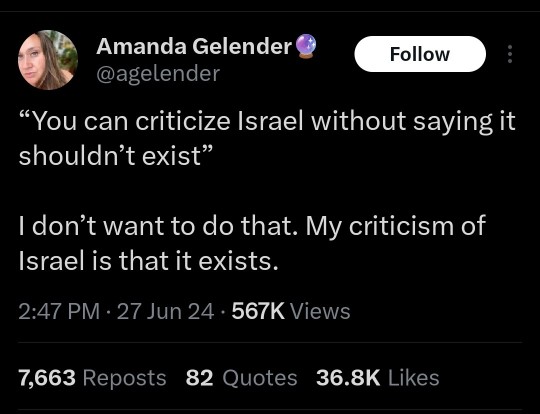
2K notes
·
View notes
Text
As the Zapatistas say, “walking we ask questions,” [...].
It is about working together, side by side, in common purpose. We try to reach a sense of reciprocity -- we work towards the world we want to see together. [...] [W]e each bring to the table what we can. [...] Solidarity [...], at its best, it is about relationships and becoming [...] people who actually care about each other. In reality, solidarity is a messy and exasperating exercise. [...] There were countless brilliant initiatives and projects that were a credit to national and international solidarity, from introducing potable water systems, solar energy supply, technologically appropriate means of communication, pirate radio, organic horticulture [...]. And of course, there were a lot of unsuccessful and failed ventures, because it was a learning experience [...].
Beyond solidarity, the Zapatistas were planting the seed of Zapatismo and encouraging people to, instead of simply supporting them, “Be a Zapatista wherever you are.” Solidarity as movement building. When asked what the best contribution was that internationals could make to the Zapatista struggle, an old Zapatista back then said, “More Seattles.” A more contemporary version would be “More Black Lives Matter Uprisings.” [...]
---
Within Fortress Europe there are various territorial bases of what might better be described as counter-power. [...]
[I]n Athens, [...] the rebellious neighborhood of Exarchia is home to a large community of Greek and international radicals. [...] The people have created a neighborhood-wide structure to offer support to refugees and migrants and [...] they live together, they eat together and they struggle together. Activists have squatted buildings to provide shelter for those that needed it, food is distributed from various social centers [...], there are free health and education initiatives and resources are shared [...]. Walking around Exarchia [...], you get a palpable sense of everyday solidarity -- not just with the refugees and migrants, but for global social and political movements based in the neighborhood, from Kurds to Palestinians. [...]
For years, Exarchia has been a living, breathing center of counter-power in the [Euro-American] [...] core committed to supporting developments in the periphery in a reciprocal manner. And it’s the threat of a good example, which is why they are faced with unrelenting state repression. Now, because of the rapid gentrification of the area [...] and the rampant commodification of living spaces via [air b and b], it can feel like a territory under siege. [...]
---
Exarchia is not exceptional, there are bases of anti-systemic alternatives all across Europe albeit on a smaller scale and in different forms. I’ve witnessed comparable autonomous projects in, for example, the Connewitz neighborhood in Leipzig, or Vallekas in Madrid. Christiania in Copenhagen is something else -- more of an intentional community -- but shares similar traits. The common factor is the desire to create communal, non-capitalist initiatives that bring people together and foster mutual aid. [...] These are dark days in Europe with the rise of the far right, the climate crisis, the pandemic and gross inequality. What the anti-systemic nodes represent is a radical alternative and a ray of hope.
---
Words of Ramor Ryan as transcribed in an interview conducted by Liam Hough. Published as: Ramor Ryan. “Zapatismo, solidarity and self-governance: a conversation.” ROAR Magazine. 23 March 2022. [Some paragraph breaks and contractions added by me.]
135 notes
·
View notes
Photo

Join us for a virtual tour of JR: Chronicles, the first major exhibition in North America of works by the French-born artist JR. Working at the intersections of photography, social engagement, and street art, JR often collaborates with communities by making portraits and wheat pasting them in nearby public spaces. See how JR has expanded the meaning of public art through his ambitious projects that give visibility and agency to a broad spectrum of people around the world.
Created by Sharon Matt Atkins, Director of Exhibitions and Strategic Initiatives, and Drew Sawyer, Phillip Leonian and Edith Rosenbaum Leonian Curator, Photography, Brooklyn Museum.
Born in Paris in 1983 to Eastern European and Tunisian immigrant parents, JR began his career as a graffiti artist under the alias Face 3.

JR (French, born 1983). Expo 2 Rue, Action à Paris, 2001–4. Gelatin silver photograph. © JR-ART.NET
After finding a camera in the Paris Métro in 2000, he started to document his posse of friends in the act of graffitiing and eventually pasted photocopies of these images onto exterior walls and added painted frames, creating Expo 2 Rue (Sidewalk Galleries).
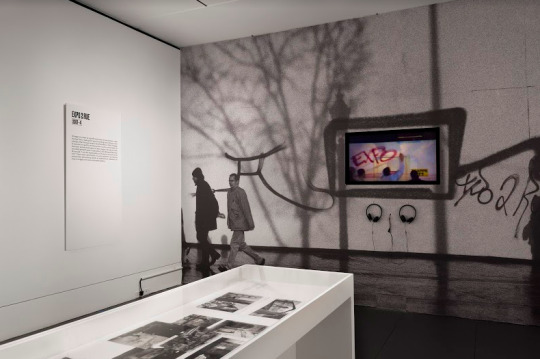
Since the pasted images almost always get washed and worn away, documentation of these installations, including the voices of the participants through video and audio recordings, is central to JR’s practice.
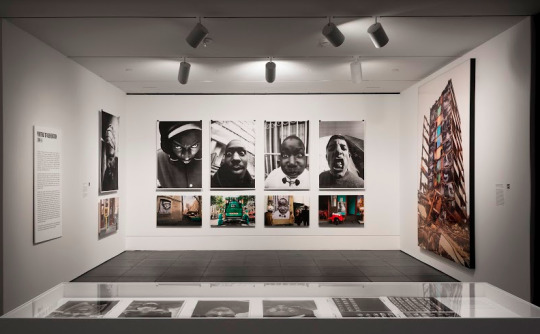
In 2004 JR initiated his first major public project, Portrait of a Generation, which featured photographs of young people from housing complex in the Parisian suburbs of Montfermeil and Clichy-sous-Bois.
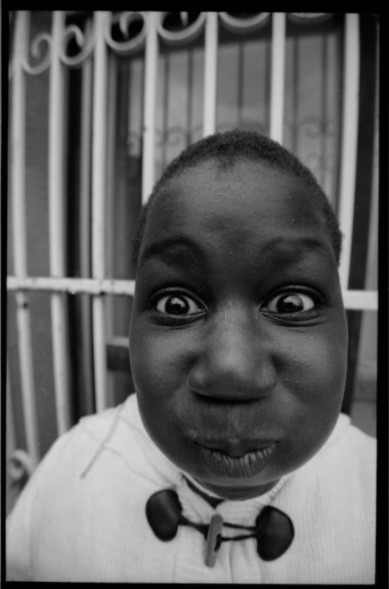
28 Millimètres, Portrait d’une génération, Amad (2004). Gelatin silver photograph. © JR-ART.NET
JR and his friend Ladj Ly, a filmmaker and resident of Les Bosquets, worked with these communities to produce black and white portraits.
JR used a camera with a wide-angle lens, which not only distorts their faces but also conveys extreme proximity and intimacy, as opposed to photojournalists who use telephoto lenses from a distance.

28 Millimeters, Portrait d’une generation: Amad, Paris, Bastille, 2004. Installation image. Wheat-pasted posters on building. © JR-ART.NET
JR and his collaborators then pasted the enlarged images in the surrounding neighborhood of Montfermeil and, eventually, throughout central Paris. Each pasting included the name, age, and address of the sitter.
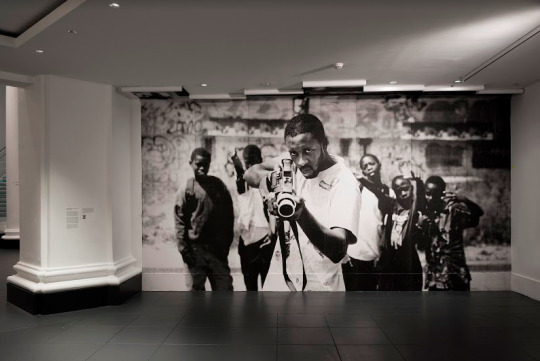
This photograph of Ladj Ly and friends was the first large-scale image that JR and his friends wheat pasted in the neighborhood prior to the riots there in 2005. It appeared as the backdrop in photographs accompanying newspaper articles and television footage about the uprising, thereby becoming JR’s first published work.
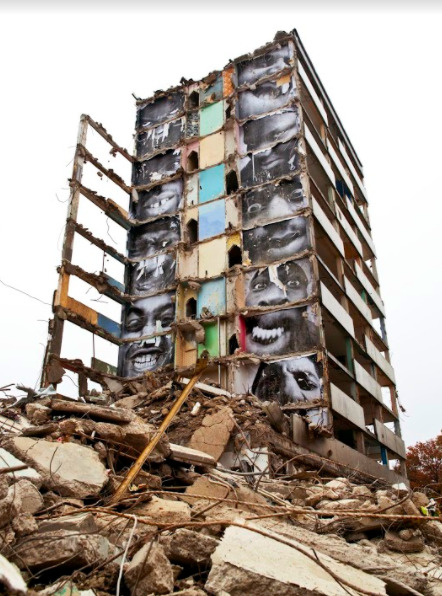
JR (French, born 1983). 28 Millimètres, Portrait d'une génération, B11, Destruction #2, Montfermeil, France, 2013. Installation image. Wheat-pasted posters on building. © JR-ART.NET
In 2013 JR learned that the housing towers in Les Bosquets were going to be demolished, so he and a group revisited the Portrait of a Generation project by pasting portraits in the interior. As the buildings were being torn down, the monumental images of residents were slowly revealed.
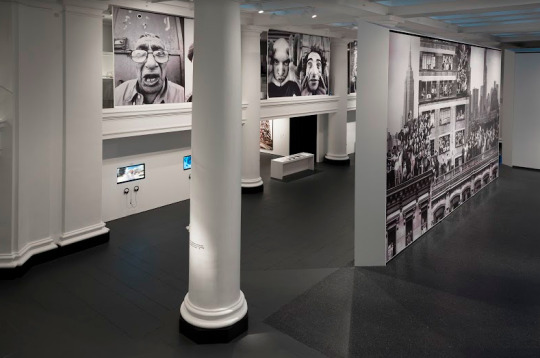
In 2005 JR traveled to Israel and Palestinian territories, where he and his friend Marco were inspired to carry out a public project similar to Portrait of a Generation.
The following year, during a period of fierce tension and fighting in the Gaza Strip, they began meeting with and making portraits of Palestinians and Israelis who held the same jobs.
Ayman Abu Alzulof, a Palestinian actor from the town of Beit Sahour, said he agreed to be photographed because the images would be seen on both sides of the border. "It shows that both parties look like each other, as human beings,” he explained. “It's difficult to differentiate between a Palestinian face and an Israeli face. It will also show that we live here. I think a lot of people will talk about it.”

In 2008 JR initiated Women Are Heroes after learning about the deaths of three young men in the favela of Morro da Providência in Rio de Janeiro, Brazil, and the subsequent riots ignited by the involvement of the Brazilian military.
The exhibition includes this multi-media diorama that narrates the stories of the participants and project.
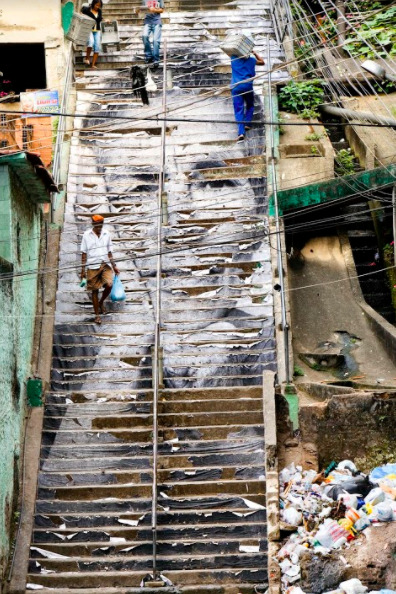
28 Millimeters, Women Are Heroes, Action dans la Favela Morro da Providência, Stairs, a Few Days Later, Rio de Janeiro, Brazil, 2008. Color lithograph. © JR-ART.NET
After meeting with residents for a month, the artist collaborated with them to make photographs of the eyes and faces of local women, including some related to the murdered men. Together, they pasted the blown-up images on staircases and buildings around the favela.
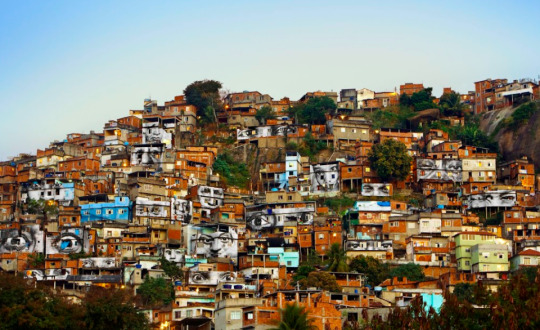
28 Millimètres, Women Are Heroes, Action dans la Favela Morro da Providência, Favela de Jour, Rio de Janeiro, 2008. Installation image. Wheat-pasted posters on buildings. © JR-ART.NET
Giant faces and eyes appeared to be staring down into Rio from the hilltop.

Casa Amarela, in Morro da Providência, Brazil. © JR-ART.NET
JR continues to work with the communities with which he partners. In 2009, he established the Casa Amarela (Yellow House) in Morro da Providência in 2009.
The moon on top of the house is actually a room, where artists from all over the world can stay in exchange for conducting workshops for the children and adults of the favela. They just celebrated their 10th anniversary!
The exhibition includes a model of Casa Amarela, created by Brazilian artist Raphael Truffi Bortholuzzi

Between 2008 and 2010, JR also completed Women Are Heroes installations in Cambodia, India, Kenya, Liberia, and Sierra Leone.
Here is an installation that shows portraits of some of the participants alongside an aerial shot of the images printed on vinyl and installed on rooftops in Kibera, Kenya in 2009.
The images both transformed the landscape and provided protection from the rain.
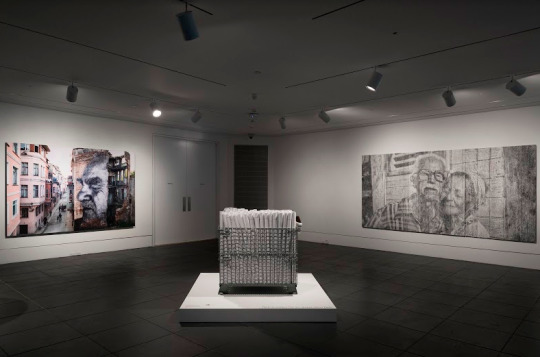
In 2008 JR began his project The Wrinkles of the City in Cartagena, Spain. As he had done for Women Are Heroes, JR collaborated with the community to create large-scale portraits. This time he photographed the oldest inhabitants of the city.
This gallery also demonstrates more of JR’s process, including the rolls of paper shown here and mockups.
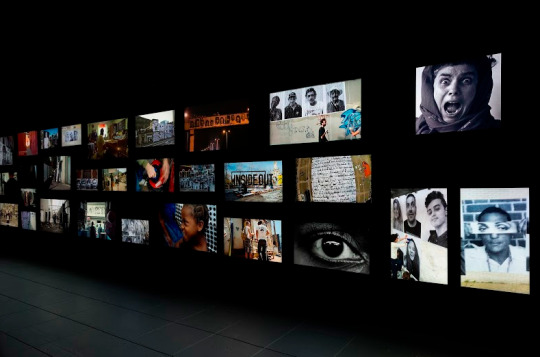
In 2011 JR won the TED Prize, a $100,000 award given to “leaders with creative, bold wishes to spark global change.” The prize enabled JR to launch Inside Out, a global public art project. He began encouraging others to use his process and providing the means to do so, expanding his collaborative practice to a fully participatory art project.
This installation highlights many of the Inside Out projects (@insideoutproject) through more than 50 videos created by the organizers and participants of actions around the world.
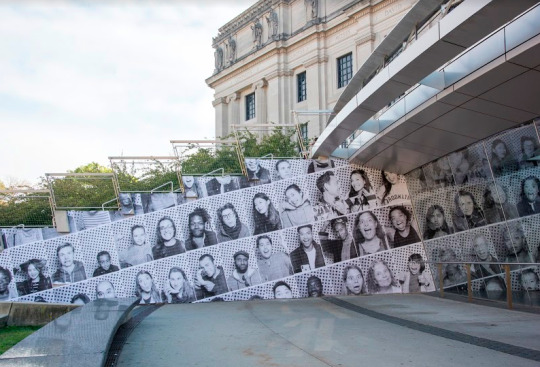
Since 2011 more than 400,000 portraits have been pasted in 141 countries worldwide, including visitors to the Museum’s First Saturday programming last August!

In September 2017 JR installed a monumental photograph of Kikito, a one-year-old boy from Tecate, Mexico, in a location near the child’s home along the U.S.-Mexico border. The giant toddler, seeming to peer over the fence, prompted the viewer to wonder, What does a child think about a fence he sees every day?
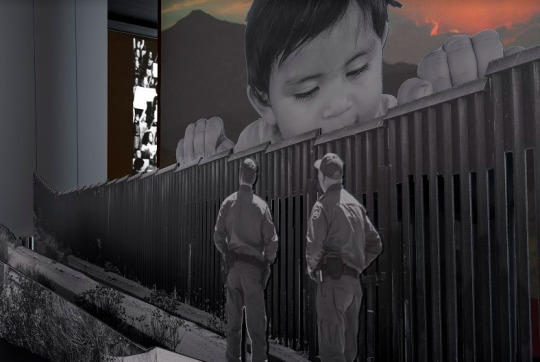
Kikito, 2017
Although the nearly 70’ tall image stood in Mexico, it could best be viewed from the United States. Kikito’s mother remarked: “I hope this will help people see us differently than what they hear in the media. . . . I hope in that image they won’t only see my kid. They will see us all.”

JR (French, born 1983). Migrants, Mayra, Picnic across the Border, Tecate, Mexico—U.S.A., 2017. Installation image. Wheat-pasted poster on table. © JR-ART.NET
On October 8, 2017, for the last day of the Kikito installation at the U.S.-Mexico border, JR organized a gigantic picnic on both sides of the wall. Kikito, his family, and dozens of guests came from the United States and Mexico to share a meal.
People at both sides of the border gathered around the eyes of Mayra, a “Dreamer,” eating the same food, sharing the same water, and enjoying the same live music (with half the band’s musicians playing on either side).
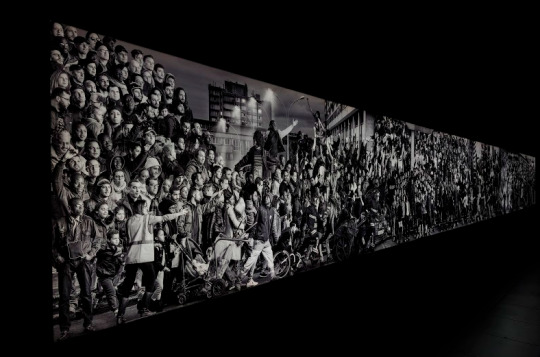
In 2016 JR returned once again to Clichy-Montfermeil with the filmmaker Ladj Ly to photograph more than 750 people from the Parisian suburb in order to create a large-scale mural, inspired by the work of the Mexican painter Diego Rivera.
In 2017, the mural was installed at Les Bosquets. Here the work is shown as a large-scale transparency print in a lightbox.
In early 2020, JR started teaching a course titled “Art and Image,” at the École Kourtrajmé, a film school in the neighborhood founded by Ladj Ly.
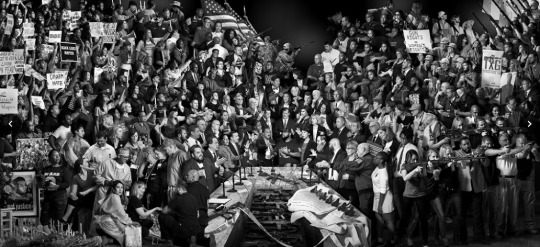
Still from The Gun Chronicles, 2018. Video, black and white, sound; 4 min. loop. © JR-ART.NET.
Commissioned by Time magazine for its cover on November 5, 2018, this video mural visualizes a spectrum of views on guns in the United States through collaged portraits of 245 individuals, including gun collectors, hunters, law enforcement officials, shooting victims, emergency room teams that treat victims of mass shootings, and gun industry lobbyists.
Participants were invited to share their individual views, describe their own experiences, and search for common ground; their accounts are accessible on the project's website.

At the center of the exhibition is JR’s new monumental mural project, The Chronicles of New York City (2019). In the summer of 2018, JR and his team spent a month roaming all five boroughs of New York City, parking their 53-foot-long trailer truck in numerous locations and taking photographs of passersby who wished to participate.
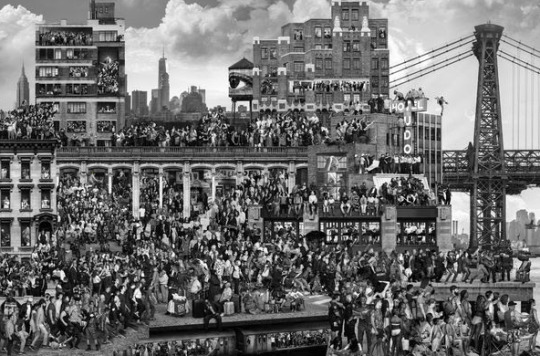
JR (French, born 1983). The Chronicles of New York City, 2018–19 (detail). © JR-ART.NET
Each of the 1,128 participants was photographed in front of a green screen, and then the images were collaged into a New York City setting featuring architectural landmarks.
The participants chose how they personally wanted to be represented and were asked to share audio recordings of their stories, which are now available on a free mobile app.
In keeping with the public and collaborative nature of JR’s art, the museum partnered with organizations in Brooklyn to install murals throughout the burough.
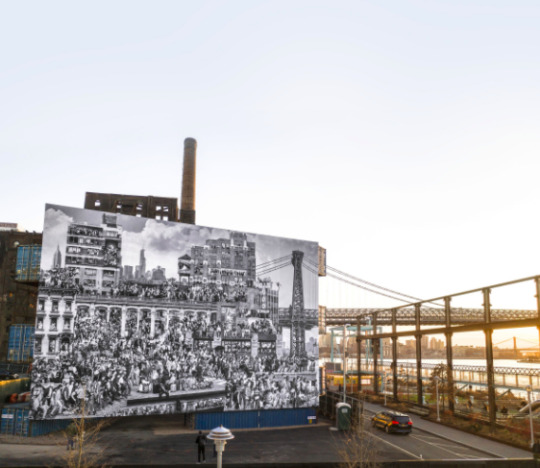
The Chronicles of New York City, JR and Triangle Stack 2, LOT-EK at Domino Park Photo credit: Marc Azoulay - JR-ART.net
A monumental version of The Chronicles of New York City is on view in Domino Park (@dominopark) in Williamsburg, Brooklyn. The project has been conceived in collaboration with LOT-EK, which designed Triangle STACK #2 to help bring JR's mural into the city's open space.
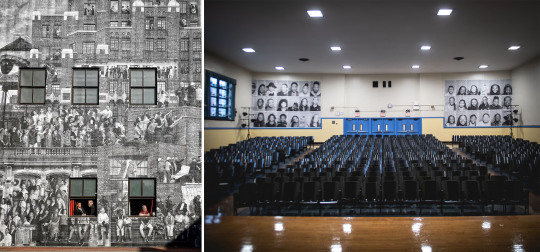
Installation view of The Chronicles of New York City at Kings Theatre, 2019; and Inside Out project at Brooklyn Academy of Global Finance, Bedford-Stuyvesant Courtesy © JR-ART.NET
JR’s murals are also on view at Kings Theatre in Flatbush and the Brooklyn Academy of Global Finance in Bedford-Stuyvesant.

Thank you for joining us on our tour of JR: Chronicles. Tune in next Sunday for another tour of our galleries!
Installation views of JR: Chronicles by Jonathon Dorado
#Virtual#Virtual Tours#Virtual Programming#Brooklyn#Brooklynmuseum#jrartist#JR#Art history#bkmphotography#jrbkm#jr chronicles#nyc#brooklyn museum#photography#street art
111 notes
·
View notes
Text
Israel's Arab Parties are Kicking the Door Down
The second Israeli election of 2019 is now in the books. Ballots are still being counted, but we can be almost entirely sure that when all is said and done, the Joint List -- a unified bloc of Israel's Arab parties (plus the Israeli communist party, which represents both Jews and Arabs) will be Israel's third largest party. Right now, the JL has won 13 seats in the Knesset (Blue & White is in the lead with 33, followed by Likud with 31; the Sephardic-religious party Shas is in fourth with 8). This is a superb showing for the Arab bloc, which overcame vicious incitement and suppression efforts, and they have not been hesitant to dunk on Netanyahu in celebration (when Netanyahu asked what ministerial positions Blue & White promised the JL, party leader Ayman Odeh replied "The Minister of Affairs of Sending You Home."). And I think this is actually even a bigger deal than many are letting on. Historically, Arab parties have not sat in government -- both because they've refused and because the Jewish parties have refused to sit with them. It is unlikely that this will change this time around -- though there remains a chance that JL could support a Blue & White coalition from outside the government. Yet we are starting to see some cracks. Labor has explicitly urged B&W leader Benny Gantz invite the Arab parties to the negotiating table to potentially join a coalition, and apparently Gantz and Odeh will be having a meeting. Whereas in April the Arab parties didn't recommend anyone for Prime Minister, now there are some indications they may back Gantz -- they've at least put out a list of commitments they want from Blue & White on issues ranging from restarting the Israeli/Palestinian peace process to fighting crime in Arab neighborhoods. But the most likely outcome of coalition negotiations is probably a "unity government" with both Blue & White and Likud joining a few smaller parties. In that universe, the Joint List -- as the largest party not in government -- would become leader of the opposition; a position which, ironically, would give them unprecedented access and influence within Israel's government. All of this -- the feting for coalitions, the potential kingmaker status, the position as presumptive leaders of the opposition -- is a result of one thing: Arabs turning out to vote. I've noted for awhile now that the "left" (or at least "not-right") bloc doesn't have a plausible route to power in Israel any more that doesn't go through the Arab community, and results like these will impress that fact on people's minds. Labor is starting to get it, Gantz is starting to get it, and the Arab parties themselves are certainly starting to get it. And this is how change happens. Forget waiting for the majority feel magnanimous. Kick the door down and make yourself a political force to be reckoned with. Go back and read Carmichael and Hamilton's Black Power -- you make yourself into an indispensable voting bloc whose support is necessary to prevailing in a given election, and you can extract a lot of goods even in the most hostile society. The Joint List is in a position of real power right now. They've earned it. Time to see how they use it. via The Debate Link https://ift.tt/2M3zfc8
19 notes
·
View notes
Photo
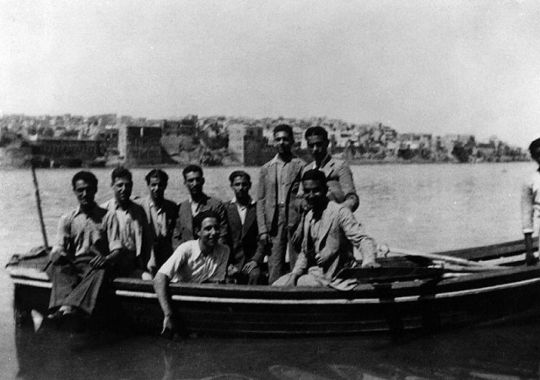
Fiction, Poetry, and the Shaping of Mizrahi Cultural Consciousness
By Sophie Levy

This article was originally published in the Fall 2019 issue of The Current, a journal of politics, culture, and Jewish affairs at Columbia University.

“So sometimes people think we are Arabs
and they are Jews?
[My nephew’s] words make flocks of birds fly through my body
ripping my blood vessels in the commotion
and I want to tell him about my Grandmother Sham’a
and Uncle Moussa and Uncle Daoud and Uncle Awad
But at the age of six he already has
Grandmother Ziona
Grandmother Yaffa
lots of uncles
and fear and war
he received as a gift
from the state.”
- Adi Keissar, “Clock Square”

I read Adi Keissar’s poetry for the first time at fifteen years old, when my mother forwarded me a link to Haaretz’s Poem of the Week under the headline “Who’s who? Who’s an Arab, who’s a Jew?”

The poem was a vignette of a conversation between Keissar and her young nephew as they walked beside the clock tower in Jaffa, tracing the aftermath of his distant observation of a man speaking Arabic. With each consecutive line, I felt like an anvil had been dropped on my chest (in the best way possible). Why did a Persian girl from Los Angeles who hadn’t really thought about her Judaism in years feel such a punch in the gut from a poem by a Yemeni woman in Israel? It felt incomplete and a little tacky to exclusively attribute my reaction to our shared Judaism. There was another layer to consider— a quiet but strong common denominator between the way I thought of my family and the way Keissar wrote about hers, even though I grew up hearing Farsi spoken more than Arabic, and I am American, not Israeli.

I only heard the word Mizrahi used to describe people from Middle-Eastern and North African Jewish backgrounds a few weeks before I read “Clock Square.” It made sense to me that there was another word for us out there—for Jewish people who called ourselves Sephardi even though our supposedly Spanish lineage seemed less-than-factual. It felt good to become aware of this new, audibly articulated way of making a distinction I wanted made—not because I resented the Sephardi label, but because I noticed something different about the community from which I came, and those differences were bound to Iran, not Spain. I let the word roll around inside my head and off my tongue. Mizrahi. So that’s what I’m called.

Of course, label-picking in the age of identity politics can sometimes take on a flattening or superficial connotation. It’s understandable that pinning any one label onto a multifaceted self can feel stifling, and there's been no shortage of analysis surrounding the derogatory or Orientalist undertones of Mizrahi’s literal translation to eastern. It’s a subject that often comes up in the company of other young Arab and Persian Jews I know, some of whom also feel distanced from the term’s relatively recent or “artificial” origin in Israel’s political lexicon.

Bearing this nuance in mind, I would still argue that identification with and critical thought surrounding the issue of Mizrahiut can open the doors for a new, constructive, collective self-perception— one that’s rooted in a consciousness of culture, heritage, and history. In her essay “The Invention of the Mizrahim,” Ella Shohat acknowledges how the Mizrahi label can be seen as a construct born from societal formation under Zionism, but also sheds light on its strengths. She notes that Mizrahi identity “celebrates a Jewish past” in Southwest Asia and North Africa, and that in turn, it can imply a “future of revived cohabitation” with other peoples of the region. In the meantime, its inclusion of a diverse range of Jewish communities places value on the cultural dialogue that ensued between them once they encountered each other in Israel (or in Western countries, as in my family’s case).

The story of Mizrahi immigration to Israel is not a smooth one. Between 1948 and 1951, roughly 325,000 Southwestern Asian and North African Jews migrated there, following their departure or expulsion from their countries of origin. Upon their arrival, many were placed in transitory refugee camps (ma’abarot) with poor conditions, later being displaced to remote development towns or vacated Palestinian neighborhoods in Jerusalem—situating them in Israel’s geographic and socioeconomic periphery. Their ensuing civil rights struggle would continue for decades.

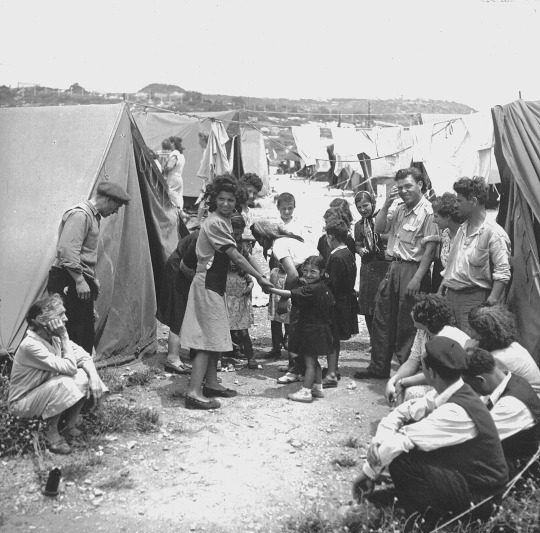

Mizrahi refugees at a ma’abara in the early 1950s.

Contemporaneously, an underground Arabic literary network began to take shape, connecting Mizrahim in Jerusalem and the ma’abarot with Palestinian writers who remained in Israel proper after 1948. Fiction writers like Sami Michael and Shimon Ballas got their start publishing short stories in al-Jadid, an Arabic-language, left-aligned journal that served as a vital platform for Mizrahim and Palestinians alike in the early decades of Israeli statehood. The novel soon emerged as a favorite medium of Mizrahi writers (many of whom were Iraqi men), their characters’ psycho-emotional turmoil reflecting the tumult of the political changes in which they were caught. Whether set in Baghdad, Jerusalem, or Haifa, these novels lamented the waning reality of integrated Muslim-Jewish life, criticized the treatment of Mizrahim in Israel, and conveyed wistful longing for Iraq— all in Arabic.

However important this underground fiction movement was, its tangible success in spurring Mizrahi cultural consciousness among a wider public was limited. Contributors to al-Jadid were writing almost exclusively in intellectual circles, hiding themselves from wider readership in ma’abarot or other communities of Arabic-speaking immigrants to Israel. Further, the overwhelming cultural dominance of the Labor Zionist Ashkenazi literary canon and the disenfranchisement of Mizrahim on a material level led to practical obstacles to publishing. Thirdly, although the deliberate decision on the part of these authors to write (sometimes exclusively) in Arabic was a commendable act of resistance against the state’s efforts to stifle the language’s use, this reduced their novels’ wider appeal to a Hebrew-speaking public. Amid the political activism of the Mizrahi Black Panthers and the decline of the Labor Party in the 1970s, Mizrahi novelists were able to publish their work more frequently; yet even then, they mostly remained on the margins of literary life in Israel— dear to a burgeoning community of Mizrahi academics, but largely unknown to a wider audience.

Despite these barriers to recognition, Mizrahi fiction was and is of value. The often explicitly-stated goal of these novelists was to encourage a sustained connection to and appreciation of the worlds they were a part of before their displacement to Israel. By writing in Arabic, they demonstrated acute political and historical consciousness, challenging the state’s prevailing narratives about Mizrahi primitiveness, its effective demonization of Arab language and culture, and its dismissal of any positive bond to diasporic life. Most importantly, in the words of the writer Almog Behar, their work “carried a torch” for Mizrahim of future generations — like Adi Keissar, and like me.

After “Clock Square,” I started reading Keissar’s work almost voraciously, scouring Haaretz and the Forward for translated poems when I couldn’t understand enough of her Hebrew. As a flagrantly opinionated teenager, I got a high from her blunt feminism and indulged in the refreshing matter-of-factness with which she expressed the depth of her emotions. After having left my majority-Mizrahi Jewish day school for the odd funhouse mirror of a secular, preppy, majority-white high school, it felt like a comforting exhale to settle in the sweet, relatable sadness of poems like “Black on Black:”

"My grandmother loved me with a thick accent
spoke to me Yemeni words
I never understood,
and as a child
I remember
how scared I was to stay alone with her
out of fear that I wouldn’t understand the tongue in her mouth [...]
the sounds far, far away
even when she spoke closely.”

I didn’t yet know enough about Israeli history to fully grasp the political subversiveness of Keissar’s poetry, but I did know that her work made me feel seen. I felt estranged from the no-questions-asked Zionism of the Reform, Ashkenazi institutions I belonged to as a child, and I felt detached from my high school’s country-clubby, all-American ethos. Sometimes, as much as it embarrassed me to admit it, I felt the same distance from my large and (lovingly) overbearing Persian family, and even from other Mizrahi kids. Yet the more I looked into Adi Keissar’s work, the more I understood I wasn’t alone in those feelings, and the more I understood there were ways to address them constructively.

The fact that my mother came across “Clock Square” on Haaretz in English translation was not only indicative of Keissar’s increasing success as an individual poet, but of the rising recognition of a poetic movement she had ignited a few years prior. Keissar is the founder of Ars Poetica, a collective whose name is a double-entendre between Horace’s The Art of Poetry and the word ars عرص — a slur reserved for Mizrahi men that essentially translates to pimp in Arabic. Bringing together Mizrahi poets of diverse ages and backgrounds under an all-women roster of leaders, the group has put a new spin on the poetry reading by reinventing it as the hafla (Arabic for party).

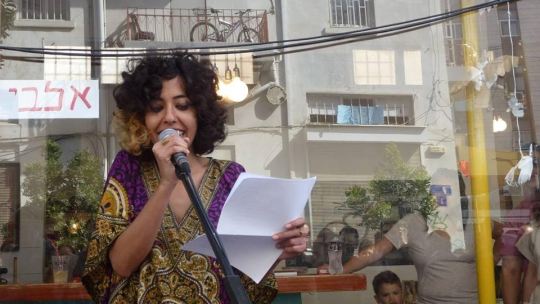

Adi Keissar at a poetry reading.

Since Keissar organized a night of rousing performances by spoken-word poets, alternative DJs, and belly dancers at her first hafla in 2013, Ars Poetica’s loud, multifaceted reclamation of Mizrahi cultures has sent shockwaves through Israel and beyond. Keissar, Roy Hasan, and Tehila Hakimi— additional members of the group and renegade poets in their own right— all won the Bernstein Literary Prize within two years of Ars Poetica’s launch. Change is also felt elsewhere. Erez Biton, often seen as a father figure of this poetic movement, faced many of the same obstacles to mainstream success as his fiction-writing contemporaries for decades, until he became the first Mizrahi writer to win the Israeli Prize for Literature in 2015. The next year also presented a huge milestone, when Biton was appointed as chairman of a new governmental committee dedicated to promoting the inclusion of Mizrahi history and literature in school curricula. Since Ars Poetica’s founding, the group’s impact has garnered extensive media attention, with Jewish newspapers and poetry magazines in the US and Britain publishing article after article about the “Mizrahi Revival” cropping up in Israel.

Ars Poetica may well have triggered the strongest shake-up of Liberal Zionist, Ashkenazi hegemony in the context of Israeli literature to date. Of course, as we’ve seen, the written fight for Mizrahi recognition didn’t begin with Keissar, but her collective does much more than function as a simple continuation of the efforts of writers who preceded them. The group’s unprecedented headway is the result of taking that history, learning from it, and building on it in a new direction.

One thing this “new direction” has entailed is a deeper, more intersectional, subversive strain of political consciousness. Written attacks on the structural subordination of Mizrahim now often serve double functions; when Adi Keissar writes in embracement of her body and physical features as a Mizrahi woman, she is also writing to undo the internalization of racialized misogyny. When Roy Hasan bristles against the performative liberalism of centrist Ashkenazi elites, he is also tackling Israel’s class divide as it occurs along ethnic lines. Keissar and Hasan’s ability to synthetically address a broader range of societal issues in their work with relative brevity enables it to speak to a readership wider than that of the novelists before them.

Furthermore, Ars Poetica’s rejection of elitism goes beyond the content of their poems and permeates their approach to language itself— their verses often full of curses and reclaimed slurs, their Hebrew colloquial, their tone raw and piercing. Hasan points to Jay-Z and the Wu-Tang Clan as important influences on his writing, and it only takes feeling the rhythm of repetition and line breaks in his poem “In the Land of Ashkenaz” to feel their impact on his work:

“...I am the armed fucking robbery
The crook with the kippah
In the court of law
I am the graves of holy men
And talismans
I am a pimp
I am clapping hands
And cheap music
Low culture
Low grade
A stubborn root
And a pain in the ass…”

Between the subject matter of its members’ poetry, their use of vernacular language, and their formulation of the hafla as a truly grassroots method for communal ingathering and artistic promotion, Ars Poetica has shown itself to be founded on a sense of radical accessibility. These poets are stripping their medium of the sterile, elite connotation it has borne for many working-class Mizrahim and presented it as a reachable, usable medium for readers, thereby breaking down the barriers that kept Keissar herself from writing poems until she was in her thirties. It’s predictable, of course, that this accessibility has garnered some backlash from prominent Ashkenazim in mainstream literary institutions; critics have branded their poems as too angry, unrefined, or unsophisticated— arguably recalling decades-old biases about Mizrahi primitiveness. I think it’s safe to say that Keissar and Hasan would meet their discomfort with a scoff and a smile.

There’s also something to be said about the rise of poetry as the medium of choice for many of today’s Mizrahi writers. Prose still has its merits, of course; fictional narratives are a way of emotively articulating and preserving a fairly developed sense of what life was like for Mizrahim before 1948. It remains relevant, as demonstrated by the writer Ayelet Tsabari, for instance, in her use of short stories to create strikingly beautiful vignettes of modern Mizrahi life. But poetry, by virtue of its performability and new aura of accessibility, has demonstrated a special potential for change— not only in Ars Poetica’s move closer to the spotlight in Israel, but in its ability to effectively reaffirm the value of Mizrahiut in the eyes of an ordinary reading public.

This new wave of Mizrahi writing is turning heads toward old and new writers alike. A sweet consequence of the poets’ success today has been rising recognition of yesterday’s novelists, and that recognition is happening in contexts much more interesting than just Israeli academia. This past October, Mahmoud Abbas requested the printing of Ishaq Bar-Moshe’s novel Departing Iraq for distribution at a “conference for Arab leaders” in the West Bank, echoing the author’s hopes for cooperation and consistent interaction with Palestinian Arabs. Meanwhile, the media buzz around Ars Poetica has exposed young Mizrahim in the diaspora to the concept of cultural revival, creating real potential for us to process what we’ve been through, scrutinize where we are, and connect to where we come from.

That’s certainly what new Mizrahi poetry has done for me. I should clarify that my close family doesn’t have a history of immigration to Israel, and I will not erroneously claim to understand what it’s like to grow up in a majority-working class, Mizrahi development town. Even so, amid the difficulties of toggling between life in a huge, close-knit Persian family and finding myself lost in Ashkenazi-run, ardently Zionist institutions, I’ve noticed links between the kinds of alienation many Mizrahim feel from our cultures, whether we were raised in Israel or in the Western diaspora.

The experience of occupying any larger, Ashkenormative framework presents its commonalities: being discouraged or prohibited from speaking Farsi or Arabic as if it were a vulgarity, receiving minimal formal education in Jewish history aside from shadowy mentions of the Holocaust or sanitized tales of Israel’s establishment. From another angle, the legacy of our parents’ or grandparents’ exile from Muslim countries presents its own unique implications: a precarious relationship to the languages that came before English or Hebrew because of the political stigmas they bear, the angst or detachment that results from not being able to see your family’s country of origin because of blacklisting or hostile diplomatic relations. All of this feels disorienting, to say the least.

Written endeavors to foster Mizrahi cultural consciousness— whether academic or creative, intellectual or grassroots— have not only sought to combat this disorientation, but to engage with it on a deeper level, to wrestle with it and derive something of substance from that struggle. The Mizrahi writing with the strongest impact and the most meaningful legacy does more than shallowly advocate that we “connect to our roots;” rather, it demands that we unravel feelings of disorientation and displacement by facing our histories in full, envisioning what we want for the future, and giving ourselves a voice to communicate that effectively. This means reckoning with our relationships to Ashkenazi institutions and communities, but also to non-Jewish Middle-Eastern ones. Iraqi novelists sought to reach across the latter divide by writing in Arabic, and progressive Mizrahi writers today do the same in their advocacy for increased solidarity with oppressed populations across the region.

Engaging with Mizrahiut in a modern context also prompts us to reevaluate the idea of the “homeland.” There is discomfort in an awareness of our communities’ intense estrangement from places and worlds that were once inextricable from our existence. But out of this awareness, and out of the complex implications of exile, there is room for a new understanding of what constitutes a “homeland” for Mizrahim. Alphabets and accents, stories and poems, flavors and smells, songs and images become objects of longing often as deep as the desire for physical return to an inaccessible place. I think a lot of us quietly yearn for that feeling of home, even if we don’t always know how to articulate that or put a finger on what it is. I find it most often in the celebration of dialogue between Mizrahim, in recognizing the connections we have to the things we’ve been conditioned to forget, and in the words of writers like Roy Hasan:

“From the ruins of the language of my parents
I shall build a house for my children."
3 notes
·
View notes
Link
First off the most important issue is the millions of Palestinian refugees kicked out of their real property, a majority of which were bulldozed and replaced with Israeli socialist communes known as “Kibbutzim” (which mostly failed and became privatized “Moshavim”) and Jewish National Fund (JNF) forests. This is the most important issue due to the fact that it’s the most indisputable claim as well as the one affecting the most people and the hardest one to solve due to the entrenchment of the Israelis on that land. Some notable examples of such land are the Tel Aviv University and some of the most elite Tel Aviv neighborhoods.
The second most important issue, and the one that often gets the bulk of the attention, is treatment of Palestinians in Israeli hands (the occupation in the West Bank, legal untermenschen in East Jerusalem, the siege of Gaza, unfair treatment inside Israel).
While clearly this is a major issue, I believe it is a symptom of the conflict, but not its underlying cause, and as long as there is conflict there will be violence. So, while we can, and should pressure Israel to be a lot less violent, we can’t expect an end to a conflict without addressing the underlying issues.
Thirdly, the settlements. While the Palestinian case is strong legally, it is very weak on the basis of natural rights.The central anti-settlement claim, “since we want to make a state here you can’t homestead the land,” is cloaked in terms of “our land.” When asked to explain why it is their land they explain it is their national land, a concept which violates property rights. At times they make a better, albeit still weak, argument that since the purpose of Israelis being there is to oppress them, their homestead claim isn’t valid. As libertarians know, this claim is feeble because property rights aren’t defined by goals and aspirations, regardless of the ill or good of the intent. Additionally, many settlers, especially in the Jordan Valley, are only in that particular area for land they were granted by the government and aren’t particularly concerned who ends up governing the land as long as they can continue on with their lives. Many of them would happily work land whether it be in the Israeli South, or some as yet undefined territory.
The presented solutions to the conflict, can also be broken down into three categories, each with its own benefits and drawbacks. Let’s now turn our anarcho-libertarian examination to these categories.
Firstly, the most popular and worst solution is the two state solution. Not only does this require gross violations of human rights, and a disregard for individual property rights, it deals with the “rights of Israelis” vs the “rights of Palestinians,” rather than human rights. Little to no consideration is given for problems created by the proposed solutions. For example, what happens to a jew who legally bought a house from an Arab, or an Arab who owns property on what will become Israel? This top down solution would displace at the lowest estimates 100,000 innocent people and still not resolve some of the most significant issues. Not to mention, it solves none of the communal national level concerns such as holy sites that will remain an issue. No matter what arrangement politicians reach, religious factions will no doubt be dissatisfied with the results which will inherently destabilize whatever agreement is reached.
The second solution advanced is one that while gaining in popularity, I believe is deeply flawed and that is the idea of one democratic state. The consequences of two populations of more or less equal size wrestling for control of a state apparatus in hopes of damaging the other side, has great potential to be disastrous. Is the best answer really an American style duopoly developing between two tribes who have been in violent conflict for the last 100 years? Encouraging for the 12 million people of the region, the same kind of thinking prevalent in the U.S. of everything hinging on who wins any given election? You can see issues such as the name of the country and holy site policies swinging back and forth from election to election with all the accompanying unrest.
The third, and I believe best, solution which has emanated from a group of mixed Jewish and Arab peace advocates is known as the “two states homeland.” This brilliant bottom up idea can solve many of the aforementioned issues, while also not creating any new ones. Simply put, the plan is to establish two states in the same geographic area, each with its own parliament, citizenship etc. One for Israelis and one for Arabs. Even with a cursory glance, it is easy to see that one of the most pressing issues of how to allow the four million person Palestinian diaspora to return home. While it might not return them to former property, there would be compensations, and a return to their homeland, without having the added concern of how a democracy would marginalize the newly minted minority. This plan also solves two of the other largest issues. With two independent states that occupy the same geography, occupation and settlements are no longer concerns. While not removing the most difficult problem of what to do about holy sites, it is far superior to having a central government who controls every aspect of who can go where when. This leaves only one major unresolved issue, to which I honestly don’t know of a good solution, and that is what kind of worship can be done at each site. This is a situation that, once people have much more latitude in other regards, may end up being resolved by the people concerned. Regardless, this plan brings the most issues to resolution. Besides the obvious advantages of such a solution, the very idea of competing governments offers great possibilities. Smaller minorities would presumably have a choice in what state they wanted to join or even open their own state which could lead to many great outcomes. If this idea is implemented (and it’s the only logical solution so it has a shot) it may be the first crack we get at a testing ground for an ancap world. While it probably wouldn’t look exactly like a Rothbardian dreamscape especially with the Israeli proclivity for an authoritarian state, it could open up new possibilities there and around the world. I sincerely hope that out of this horrific conflict a new dawn of freedom can emerge perhaps even a freedom that can be spread worldwide.
Read More
3 notes
·
View notes
Text
The Four (Thousand, New) Questions
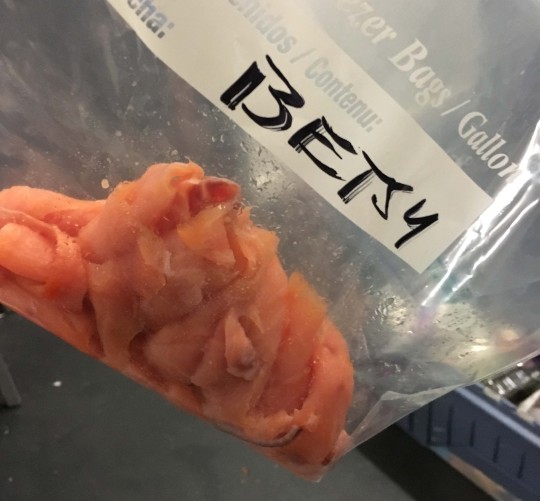
When I was growing up, I didn't really have to think too much about what it meant to be a Jewish American. A large part of that was living in New Jersey, where being a member of the tribe isn’t exactly an anomaly. In Newark, pretty much all of my friends were Jewish or Black, until I spent 2nd grade in Catholic School. You’d think that might make it weird, but even then, it wasn’t. All my new friends just had Irish and Italian names, and I got to sit in the back during mass and read, which is the dream of every second grader. And when we moved to the suburbs, things became, if anything, more Jewy. We joined Temple Israel and actually tried going to services every once in a while, and I went to Hebrew school on Saturdays. At my suburban public grade school, I learned the term “Jappy” something my friends and I called other girls that we considered spoiled, regardless of whether or not they were Jewish, and in junior high, the school bus that came from the most wealthy, Jewish neighborhood in town was sometimes referred to as “The Jew Canoe.” Who did we learn these terms from? Other Jews. We were the ones trading in the laughable stereotypes, because that’s American Jewish culture all over: we joke because we can. It’s never been in doubt in my lifetime that we belong here, to the degree that we are comfortable poking fun at ourselves, enough that while we are very aware that we aren’t and will never be the majority — and if you forget that, you always have the 30 to 60 days of Christmas to remind you — we are perfectly okay with that; and enough to feel safe in the knowledge that the past is the past, because in the Tri-State Area in the 1970s and 80s, anti-Semitism was about as real to me as Star Wars: something that existed long, long ago, in a galaxy far, far away. The same thing with Nazis. Nazis were the movie villains nobody got upset about. Nobody ever said, “Why do the Nazis always have to be the bad guys?” Why? Because they were the bad guys.
That doesn’t mean that my Jewish identity was 100% uncomplicated, mostly because I was raised to figure stuff out for myself. Mine were the kind of parents who took us to fancy restaurants and said, “Want to order the escargot? Have at it!”, perhaps not realizing that they’d end up with a seven-year-old who liked to try every appetizer on the menu but had a stomach the size of a golfball – which led to my parents gaining weight in the 70s, which led to their joining the exercise craze in the 80s...See how history happens? Being able to make my own decisions meant I could quit Hebrew school after one year (I was already a well-practiced quitter of stuff I didn't like, such as wearing dresses and learning the violin). I felt a little guilty about it, so I was definitely Jewish in that way, but one of the reasons I couldn’t get behind religious school was the fact that Judaism was supposedly my religion, but – go figure – our family was not religious. My parents don’t agree on which type of not-religious they are, since my mother describes herself as an atheist and my father calls himself an agnostic, but that’s only if you push them, since neither of them cares enough about it either way. They still identify as Jewish, and therein lay the confusion for me: Judaism is kind of an ethnic identity as well as a religion, but in a weird way, because you can convert to it, which you can’t do with, say, Slavic, and because it’s not one where we all come from one specific place, since Jews were basically driven out of everywhere. Sure, my family were all driven out of one country, Poland, but that didn’t exactly make them feel Polish. No, we were definitely Jews, just the secular kind, which is actually a thing — although I didn’t know anyone else like that in high school, the result being that in my group of friends, a mix of Jews and non-Jews, I was in my own category of Jewish, But Doesn’t Know When Any of the Holidays Are.
When I went to college on the West Coast, where I was meeting new people all the time, it was common for people tell me I didn’t “look Jewish,” which seemed to just fit right in with every other confusing part of my Jewish identity. You might think that, as a stealth Jew, I’d finally be privy to negativity about us, but that never happened. That was around the time of the rise of the religious right, and there were a lot of born-again Christians at Stanford, my freshman dorm was full of them. But while they may have believed I was going to hell, most of them still seemed happy to hang with me while we were alive – one of them even took me out for fro yo once (that’s short for “frozen yogurt,” and eating it together at Stanford in 1987 was called “dating”). If anything, being Jewish around them was an advantage, because they never tried to rebirth me the way they did other Christians, like my poor freshman roommate – I would come back to our room to find her surrounded by a group of them, looking uncomfortable, like she was getting hit on by Jesus. Mind you, I know now that my school was a liberal bubble inside the liberal bubble that was Northern California, and that protected me from a lot of things. But while we were definitely dealing with racism and sexism on campus at the time, anti-Semitism? That just wasn’t a thing.
Neither was being a Jewish person who didn’t support Israel. I didn’t know all that much about Israel growing up. I knew that it was the Jewish state, where I had once had some relatives, and that my cousins and eventually my brother — who finished Hebrew school — went to visit because they felt like it was an important way to learn about who they were. I didn’t. But when, in college, I had my first conversation with someone who’d lived in Israel about the way that Israelis felt this constant existential threat to their existence that justified their defensive posture when it came to negotiating peace with the Palestinians, even though they clearly had vast military superiority, I didn’t necessarily agree, but I got it. I understood why Israelis felt that, in a visceral, six-million-dead-just-because-they-were-like-you way that I think most non-Jews can’t.
That was probably as much of a surprise to me as it was to anyone: that, on some level, in spite of not looking Jewish, or being able to speak Hebrew, or knowing what Sukkot was (if it wasn’t about eating or presents, it didn’t make it into the Nagler Canon of Holidays), I actually still somehow just was Jewish. And that part of my identity might never have really sunk in if I hadn’t become a New Yorker. Moving here didn’t just mean that I discovered Zabars, or that I was a bagel snob, or that I would be able to have lox at catering pretty much every day (and occasionally take some home if it was really good), although those things did indeed happen. New York was able to absorb and assimilate Jewish culture in a way that allowed it to flourish as one distinct flavor of the whole that is this city of many flavors. New York is a Jewish city – in same way that it’s also Italian, Irish, African-American, Puerto Rican, Chinese, Russian, Indian, Dominican, Pakistani, Caribbean, Mexican, and the list goes on depending on who’s arrived recently and who’s coming next. And so, from the way I relate to food, to my sense of humor, to my analytical and intellectual side, to how forthright/tactless I can be, to my overall worldview: living here enabled me to recognize that I just wouldn’t be this way if I weren’t Jewish.
Everything feels different in 2019 in so many, surreal ways, but what exactly it means to be Jewish in America is definitely a big one. I’ve felt some vulnerability and uncertainty as a woman for most of my life, as you do, but I’ve never felt that way about being a Jew until now. To the point that I can’t call myself “a Jew” any more, because suddenly, that’s an epithet. How the hell did that happen? When did we allow them to take that word away? Then there’s the realization of, Wait, we can’t make those jokes any more because there are people who actually still think that shit about us? And they’re telling other people? Fucking internet. Add to that the fault lines within the American Jewish community over Israel and the ground really starts to feel like it’s swaying under your feet. How much we should continue to support this country that seems increasingly unrecognizable to me, that is so racked by fear and sectarianism that it appears to have given up on peace and democracy, that votes for a leader who has demonstrated time and again that he is both racist and corrupt? Well, now that I’ve put it like that, okay, maybe this is something that Israel and the United States have in common right now, but that doesn’t make it any better for those of use who are trying to stay on the sane side of it all. I’m lucky that most of my family is in agreement with me on these issues, but my mother has some cousins with whom she is close that she had to ask to stop sending her political emails, because their conservative views about Israel seemed to have somehow spread to abortion and immigration, despite that fact that they live in San Francisco. Jewish Trump supporters? From the Bay Area? What the hell is the going on?! Come on, this can’t be us. When an audience at the Republican Jewish Coalition cheers when Trump says “Our country’s full. You can’t come in,” don’t they hear the eerie echos of what the American government said to the boats full of Jews they sent back to be slaughtered in the holocaust? Don’t they know that we are supposed to be sharp, and educated, and fucking liberals? Oh, wait, is “liberal” now a bad word not just among conservatives but for some on the left too, as in the “liberal elite who control everything” that they’re always talking about? But, double wait, wasn’t that just another way anti-Semites used to say “the Jews” without saying “the Jews”? But triple wait, aren’t Bernie Sanders and Glenn Greenwald Jewish? WHAT THE FUCK IS GOING ON?!?!?!?!?!?!?!?!?!?!?!
Of course, this about when all of your older Jewish relatives shake their heads at all of this and say, “See? This is exactly the shit always happens to us. Somehow, when things go bad in the world, and people start believing crazy conspiracy shit, that always turns back on the Jews.” I never believed that before, so to see it sort of happening right before my eyes is really something. But at the same time, I’m sure as hell not going to let that make me just silo up. Yeah, there are the swastikas, and the Tree of Life synagogue shooting, and “Jews will not replace us,” but can we honestly say we have it worse than everyone else who’s under attack in this country right now? What’s the point of joining a grievance competition that just gives the people who are trying to divide the left exactly what they want? It’s how, when the new questions that confuse and divide us just keep coming — What do we say or not say about Ilhan Omar? What about the schism in the Women’s March? What about the Senate bill that would allow state and local governments to withhold contracts from those who boycott Israel that Chuck Schumer supported? — they just get us to go after each other.
Let’s not do that. Sure, maybe this is just another case of me getting older and less able to accept how the world is changing — sort of a, “Damn Nazis, get off my lawn!” type of thing – and maybe I should just go along with this new normal. But that's one thing I know is definitely not me. MoTs like to talk shit out, sometimes too much, but eh. Let’s bring that tradition of analysis and argument — and I mean the kind where you’re forthright and emotional, but you still know how to listen — to bear on the questions we’re having both on the left and in the Jewish community about how we move forward, instead of fleeing back into our fears from the past.
1 note
·
View note
Text
MADE BY THE SOCIETY

A society could be a cluster of people concerned in persistent social interaction, or an oversized grouping sharing an equivalent spatial or social territory, subject to an equivalent political or religious authority and dominant cultural expectations. Patterns of relationships (social relations) characterize societies between people, sharing a particular culture and institutions. Societies construct patterns of behavior by deeming bound actions or speech as acceptable or unacceptable. These patterns of behavior inside a society are referred to as social norms. Societies, and their norms, bear gradual and perpetual changes. The Wiktionary definitions of society are as follows: - A long-standing group of people sharing cultural aspects such as language, dress, norms of behavior and artistic forms. 2. A group of people who meet from time to time to engage in a common interest; an association or organization. 3. The sum total of all voluntary interrelations between individuals. 4. The people of one’s country or community taken as a whole. 5. High society. 6. A number of people joined by mutual consent to deliberate, determine, and act toward a common goal. And I base this article on the definition 1, 2, 4, and 6.
DOES A SOCIETY HAVE INFLUENCE ON MAN?
Many people argue the effect of influence on man. They say that they are what or who they are today as a result of their choices; they deny the fact that what and who they are today was gradually informed and influenced by someone else's actions and societal factors. But this is not wholly true. I don't deny the role of one's choice in becoming what and who they are today—because one has to choose to be what and who they want to be—but one's choice only happens from the storehouse of the vast options one has, and these options are nothing but influences or incentivized by influential factors; one cannot choose out of nothing. Choosing to become someone, good or evil, is influenced by someone's actions, good or evil, a historical figure or someone you know or you heard of, who their way of life appals you and you regard them as your model. This could even be your parent. Donald J. Trump once stated: "When you live in a society where the firefighters are heroes, little kids want to be firefighters. When you live in a society where athletes and movie stars are heroes, little kids want to be athletes and movie stars. In Palestinian society, the heroes are those who murder Jews." The above-mentioned is a categorical fact, depicting that our societies play a pivotal role in engineering our individuality. Our societies have influences on us. I would like you to note that this article focuses on your country, your Province or State in your country, your local area in your State or Province, the city, town or village you live in, your religion or belief as regard to atheism, your family, your ethnicity, your peer group, your religious group denomination, etc., as your societies. And when you read further, we will realize that these aforementioned societies and many others (irrespective of how insubstantial they are), have impacts on various areas of our lives. And sometimes, those impacts are irresistible.
1. SOCIETIES INFLUENCE OUR CONDUCTS
No man is born wicked (evil) or good. Every man is born with a mind that is almost like a plain paper, any information written into it, produces who the man is today. And this starts from the family (society), the closest people around them, such as mother, father, or siblings. A child begins to signalize insult with fingers at a person even before the child can speak and reason because they see an adult, a member of their family do likewise. A child is not born with hate for a person from a different race; they are not born with hate for black, white, or any colored person, they grow up to see people around them being racists, and they just incorporate the racism into their life. Etc. Beyond the family circle is the neighborhood. As the child grows in the neighborhood, every day or recurrently being exposed to the doings of the other people in the neighborhood, the child gets accustomed to them, and they could be bad doings. Other than the neighborhood, it could be campus. In campuses, people learn a lot of things they see others do. And these things could be bad things. Some became gays and lesbians, occultists, armed robbers, and many more evil identities. And also we have peer groups, religious groups, and many other groups of people by which some people become what and who they are today. In fact, there are examples of groups that stand as societies in the context of this article that almost seem exhaustible to be listed. In any of the societies you find yourself, from your family to any other category, you acculturate or the society ingrains or inculcates into your life either of the two classes of conduct, good or bad. And afterwards, people describe you with the one you chose to make part and parcel of your life. Like here in my country, Nigeria, children that live in barracks, especially military barracks, are known by some common conducts or behaviors however their temperamental dispositions: Be it sanguine, melancholy, phlegmatic, or choleric. These common conducts they are known by are ingrained into their lives by the society they live in, the barracks. Whatever societal information we allow ourselves to be informed by is what is going to make us and our conducts. Have you ever heard some parents or some persons say "this or that is not a good place to raise children"? They are simply saying that the society has bad impact on children. Jesus told a parable. He said: “The kingdom of heaven is like a man who sowed good seed in his field. But while everyone was sleeping, his enemy came and sowed weeds among the wheat, and went away. When the wheat sprouted and formed heads, then the weeds also appeared. The owner’s servants came to him and said, ‘Sir, didn’t you sow good seed in your field? Where then did the weeds come from?’ ‘An enemy did this,’ he replied...." (Mathew 13:24-28 NIV). Though the above parable is talking about the Kingdom of God, in relation to the context of this article, it can be used to refer to the nature of the mind of a man newly born into the world as it's, like I said earlier, like a plain paper, every information written into it, produces what the person is today. The tares in this parable stand as the bad impacts of a society on a man's good conduct. If, for instance, a man cultivated and ingrained good conducts into their life, and later changes a society to a society that has a herd of unscrupulous elements that are steadily venting out bad conducts on that good conduct or the person with the good conduct, such a person, if they aren’t careful, they may be influenced by that social factors to incorporate the bad conducts into their good conducts; their conducts may be adulterated with the bad conducts. And that's why today a person that was known to be very good in conducts, when they change environment or society, they become very naughty in their conducts. And you will hear people saying "he or she was not known to be this bad." The tares are the bad impacts of societies on man. The impact, especially bad one, of a society is just like a smoke of fire, especially fire made with woods. When you perpetually make the fire on a particular side of the wall of a building, in no distant time the wall will begin to turn black.
2. SOCIETIES INFLUENCE OUR MINDSETS
Mindset is simply a mentality: A way of thinking; an attitude or opinion, especially a habitual one. Or In decision theory and general systems theory, it is defined as a set of assumptions, methods, or notions held by one or more people or groups of people. A mindset may be so firmly established that it creates a powerful incentive within people or groups of people to continue to adopt or accept prior behaviors, choices, or tools.
SUPERIORITY COMPLEX AND INFERIORITY COMPLEX
A superiority complex is a behavior suggesting that a person believes he/she somehow is superior to others. People with superiority complex often have exaggerated opinions of themselves. They may believe their abilities and achievements surpass those of others. They often have boastful attitudes to people around them. But these are only a way to cover up feelings of failure or shortcomings. An inferiority complex is an intense personal feeling of inadequacy, often resulting in the belief that one is in some way deficient or inferior to others. Either of these two beliefs or opinions is ingrained into one's mind or made into one's mentality by the kind of society one's grows or lives in. For instance, when someone has an inferiority complex in their mindset, it might be because they are being consistently compared unfavorably to others; being treated unfavorably by one's peers due to belonging to a different race, economic background, or gender. In consequence, this situation causes feelings of physical and mental limitations, or experiences of lower social status in a person. And today because of an inferiority complex, some people however how good and adept they are at doing something, they lack self-confidence; they hold onto the opinion they still can't do it better than the others they hold with high esteem. It could be people of different religion, age, race, tribe, class, etc. As a result, we see some countries only consume products of other countries even when they themselves can manufacture those same products. Or even when some capable individuals manufacture the products, the locals may refuse to patronize them because their mindset is wired to think that their fellow compatriots cannot manufacture standard products, only substandard, and such a situation prompted Jesus Christ to say “A prophet is not without honor except in his own town, among his relatives and in his own home.” (Mark 6:4 NIV). And because of superiority complex, others take themselves high above others as though God. No matter their shortcomings, no matter how dumb they are, they still feel they are better than others; they still hold others with contempt and underestimation. All these are caused by the societies we were brought up in. Today in some societies, once a man says to a lady that he loves her, even before they are married, the lady tends to put all her responsibilities on the man even while she is still under her parents. While in other societies this is otherwise. This is nothing but a mindset. The mindset with which others are parenting is not the same as others, the same thing with running a family as a husband or wife. Etc. In all these, societies play fundamental roles in creating our different mindsets.
3. SOCIETIES INFLUENCE OUR BELIEF SYSTEM
A belief system is an ideology or set of principles that helps us to interpret our everyday reality. This could be in the form of religion, political affiliation, philosophy, or spirituality, among many other things. These beliefs are shaped and influenced by a number of different factors. Our knowledge on a certain topic, the way we were raised, and even peer pressure from others can help to create and even change our belief systems. The convictions that come from these systems are a way for us to make sense of the world around us and to define our role within it. We have several religions in the world. These religions vary by, especially population, mode of worship or piety, belief in God or god. The population of a religion in a particular country differs from the population of the same religion in a different country. And even in a particular country that has more than one religion, maybe having one religion more prevalent than the others or other, or having both religions sharing the same number of population, competing in predominance, you will figure out that the population of the religion or religions differ in the local areas or regions of the country. The perfect example of this is Nigeria. In Nigeria, it's common to see Christianity more predominant than Islam in some States, while Islam predominant than Christianity in some other States. And these States where Christianity is predominant, you may find out that in some local government areas of the States, Islam is predominant than Christianity. While in these States where Islam is predominant, you may find out that in some of the local government areas of the States, Christianity is predominant than Islam. While in Nigeria as a country, the two major religions, Christianity and Islam, share almost equal number of population; it's absolutely impossible for one to say "Christianity is populated than Islam or Islam is populated than Christianity in Nigeria." Sometimes ago, I was fond of criticizing and condemning some Muslims, especially the extremists for their barbaric and cruel way of life with regard to how the extremists take pleasure in bloodbath, killing innocent people just for not believing in Islam as a religion. But my wife said something to my hearing that put a stop to my recurrent criticism of the Muslims. She said that "we should thank God that we were born in Christian homes or by Christian parents not Muslim homes or parents, otherwise we would have been as barbaric as they are; we would have been doing the same irritating and abhorrent acts they are doing thinking it's the right things to do." This is nothing but the truth. After all, no one chose before their conception, by which home or parents they would come to this world; we didn't choose to come to this world through Christian or Muslim parents or home, we only see ourselves in either of them, though we still retain the liberty to make a choice; to choose to either continue being a Muslim or Christian or to either convert to become a Christian or Muslim. This phenomenon is influenced by the society. In a society where Islam is predominant, of course, you know the parents are Muslims and as they give birth to children; the children become automatically Muslims. And also in a society where Christianity is predominant, the parents will be Christians and as they give birth to children, the children become automatically Christians. This is the same with any society having a certain predominant religion or as with regard to atheism. Morality is also a part of our belief system. Morality is a recognition of the distinction between good and evil or between right and wrong; respect for and obedience to the rules of right conduct; the mental disposition or characteristic of behaving in a manner intended to produce morally good results. Or is a set of social rules, customs, traditions, beliefs, or practices which specify proper, acceptable forms of conduct. Or is a set of personal guiding principles for conduct or a general notion of how to behave, whether or not respectable. There is discrepancy in what is morally acceptable or unacceptable, or morally good or morally wrong irrespective of the moral-objectivism of the act. And this is caused by the differences between our societies that impact our belief system. The acts you regard today as evil or morally wrong that were ingrained into your belief system by the society you were brought up in, religious, family, or any other society, people may consider it acceptable acts. In fact, killing innocent person who is from different religion is considered by others from certain religions as acceptable act; as a good act required by their god. The same with some habits like sexual immorality, smoking, drunkenness, etc.
4. SOCIETIES INFLUENCE OUR DESTINIES
Many may disagree with me because many believe that destiny is that to which any person or thing is destined; a predetermined state; a condition predestined by the Divine. And this implicitly means anything that happens to an individual, good or evil, is their destiny. I agree that is a condition predestined by the Divine (God) but I don't wholly agree that when evil happens to someone is still their destiny. Some believe that destiny is unchanged because it's believed to have been predestined by God, but I believe one still retains the power to alter their destiny. God says "For I know the plans I have for you,” declares the LORD, “plans to prosper you and not to harm you, plans to give you hope and a future" (Jeremiah 29:11 NIV). This is God or Divine predetermined destiny for man. But do you think when you live in a thuggery-oriented society, where young people do drugs, smoke weed, cigarettes, get drunk, do prostitution, robbery, cultism and any other kind of vice, and you become one of them, participating in one or more of the vices, like robbery or cultism, or drug, and you later get killed, will be said that, that is your destiny predetermined by God? No. God’s destiny or plan for you is a good one but along the path, if you allow your society to negatively have impact on you, the God good plan for you may be altered. And therefore, we will say that your society influences your Destiny. Another example is, if your destiny is to become, one day, the President of your country and you are born and brought in a society that is devoid of the opportunity to acquire formal education which unchangeably stands as the credential demanded for being a President, and you do nothing to get formal education, will it be said that it's God's will that you do not become the president? No, but rather will be that it's you or your society that alters your destiny.
5. SOCIETIES INFLUENCE OUR WELL-BEING
A society that is very careless in keeping its environment clean will have a very adverse effect on the well-being of the people living in it. And as a result, when there is an outbreak of a disease like cholera, the people are most vulnerable to it. A society that is careless in its choice of food, it negatively influences the well-being of its people. And also that's why some countries have a higher number of people with some certain sicknesses, like cancer, than other countries.
CONCLUSION
Therefore, having read about some of the areas our societies have influences on, you now know that a society can either make you or mar you because 80-90% of who and what you are today are influenced by the society you live in; the kinds of society I discuss in the context of this article like family. When you live in a moral society, it will have a good influence in some areas of your life. When you live in a corrupt society, it will have a bad influence on some areas of your life, and especially that of your children. Accordingly, choose a better society. Read the full article
0 notes
Text
Friday, May 21, 2021
Record 55 million people internally displaced worldwide, NGOs report (AFP) Conflicts and natural disasters forced someone to flee within their own country every second of last year, pushing the number of people living in internal displacement to a record high, monitors said Thursday. This came despite strict restrictions on movement imposed around the globe in efforts to halt the spread of Covid-19, which observers had expected to push down displacement numbers last year. But 2020 was also marked by intense storms, persistent conflicts and explosions of violence, forcing 40.5 million people to become newly displaced within their countries, according to a joint report by the Internal Displacement Monitoring Centre (IDMC) and the Norwegian Refugee Council (NRC). That is the highest number of newly displaced reported in 10 years, and brings the total number of people living in internal displacement around the world to a record 55 million, the report showed. “Both numbers this year were unusually high,” IDMC director Alexandra Bilak told AFP, saying the surge in internal displacement was “unprecedented”.
Ring (Guardian) Amazon’s Ring “smart doorbell” is the largest civilian-surveillance network the US has ever seen, writes Lauren Bridges, a PhD candidate at the Annenberg School for Communication at the University of Pennsylvania. One out of every 10 US police departments can access videos from millions of home-security cameras without getting a warrant, Bridges says. “In a 2020 letter to management, Max Eliaser, an Amazon software engineer, said Ring is ‘simply not compatible with a free society’ [and] we should take his claim seriously.” Ring is effectively building the largest corporate-owned, civilian-installed surveillance network that the US has ever seen. An estimated 400,000 Ring devices were sold in December 2019 alone, and that was before the across-the-board boom in online retail sales during the pandemic.
Is Competition With China the New Pork Barrel? (Foreign Policy) A bill that aims to counter the fear that China is overtaking the United States technologically passed the U.S. Senate by 86 to 11 on Monday, heralding the start of a new era of strategic competition—and businesses and special interest groups are getting in on the game. The Endless Frontier Act, which has backing from both parties and the White House, would allocate $120 billion to funding new technologies, focusing on artificial intelligence, superconductors, and robotics. It would also support new hubs to geographically diversify the U.S. technology industry, which is heavily concentrated in Silicon Valley. Competition with China will be the foreign-policy priority for this and future administrations, and special interest groups see attaching their causes to the so-called new cold war as a way into U.S. government support. This in a way mirrors the Chinese political economy, where companies leap on slogans such as “Belt and Road” to win government favor. Expect a lot more rhetoric suggesting that since China is supposedly doing X, the United States must also do X to compete—or it must instead do Y in order not to be like the Chinese Communist Party.
The Gaza Conflict Is Stoking an ‘Identity Crisis’ for Some Young American Jews (NYT) Dan Kleinman does not know quite how to feel. As a child in Brooklyn he was taught to revere Israel as the protector of Jews everywhere, the “Jewish superman who would come out of the sky to save us” when things got bad, he said. But his feelings have grown muddier as he has gotten older, especially now as he watches violence unfold in Israel and Gaza. His moral compass tells him to help the Palestinians, but he cannot shake an ingrained paranoia every time he hears someone make anti-Israel statements. “It is an identity crisis,” Mr. Kleinman, 33, said. “Very small in comparison to what is happening in Gaza and the West Bank, but it is still something very strange and weird.” As the violence escalates in the Middle East, turmoil of a different kind is growing across the Atlantic. Many young American Jews are confronting the region’s longstanding strife in a very different context, with very different pressures, from their parents’ and grandparents’ generations. The Israel of their lifetime has been powerful, no longer appearing to some to be under constant existential threat. The violence comes after a year when mass protests across the United States have changed how many Americans see issues of racial and social justice. Many Jews in America remain unreservedly supportive of Israel and its government. Still, the events of recent weeks have left some families struggling to navigate both the crisis abroad and the wide-ranging response from American Jews at home.
Cleared For Take-Off? (Washington Post) After more than a year of travel into the bloc being severely restricted, the EU council is recommending member states begin opening their borders to Americans and others who have been “vaccinated with an E.U.-authorized vaccine.” Specifically, that means all the coronavirus vaccines available in the U.S. would be greenlighted, but vaccines manufactured in Russia and China would not be. Officials said the reopening could take effect within days of final approval, which should happen this week or next since E.U. ambassadors signed off on the plan on Wednesday. The guidance is not binding, however, so some countries could choose to be more or less restrictive than the bloc as a whole. Some E.U. countries require quarantines of all new arrivals, regardless of vaccination status. And Britain, which is no longer a member of the bloc, has its own separate set of rules, which as of now includes no special treatment for vaccinated travelers.
Mexico’s coronavirus deaths are plummeting (Washington Post) After suffering one of the world’s deadliest coronavirus outbreaks, Mexico is witnessing a significant decrease in cases. Confirmed deaths from covid-19, the disease caused by the virus, have tumbled more than 85 percent since January, when a brutal second wave swept the country. Mexico City, the epicenter of the country’s outbreak, went off high alert this month for the first time in a year. Officials say the capital’s coronavirus alert could soon turn from yellow to green—that is, from medium risk to low. The abrupt decline in cases has brought relief to exhausted hospital workers and some sense of normalcy to a battered nation. During the weekend, the capital’s massive Azteca Stadium opened to fans for the first time in 14 months. Thousands turned out for a pair of quarterfinal matches in the Liga MX soccer league. Scientists and government officials say the pandemic seems to be abating—at least temporarily—because of increasing levels of immunity on both sides of the U.S.-Mexico border. As much as half the Mexican population has developed antibodies because the coronavirus circulated so widely over the past year. In addition, U.S. vaccinations appear to be blocking the southward spread of the virus.
As India sets a record for covid-19 deaths, variant worries grow globally (Washington Post) India set another coronavirus milestone this week. On Wednesday, authorities announced the country had recorded more than 4,500 deaths from covid-19 for the prior 24 hours, setting a world record. Despite the record number of deaths, there are some positive signs that India’s surge may be slowing, with less than 300,000 new daily cases this week. Other countries are expressing new concern over the variant that is widespread in India. On Tuesday, British scientists said that the variant, known as B.1.617.2, could quickly become the dominant strain in the United Kingdom if it is allowed to spread. In recent days, U.S. health experts have raised their concerns about the variant spreading here, while there have been documented cases in Germany, Singapore and elsewhere. “It’s outcompeting the other viruses,” Jeremy Luban of the University of Massachusetts Medical School told NPR this week. “It’s replacing whatever variants were there before. And it’s always a concern when something like this changes because we don’t know what will happen.”
Netanyahu’s prospects bolstered amid Israel-Hamas fighting (AP) Israel is at war with Hamas, Jewish-Arab mob violence has erupted inside Israel, and the West Bank is experiencing its deadliest unrest in years. Yet this may all bolster Prime Minister Benjamin Netanyahu. Just over a week ago, the longtime Israeli leader’s political career seemed all but over. He had failed to form a coalition government following an indecisive parliamentary election, and his political rivals were on the cusp of pushing him out of office. Now, as Israel and Gaza’s Hamas rulers wage their fourth war in just over a decade, Netanyahu’s fortunes have changed dramatically. His rivals’ prospects have crumbled, Netanyahu is back in his comfortable role as Mr. Security, and the country could soon be headed for yet another election campaign that would guarantee him at least several more months in office. The stunning turn of events has raised questions about whether Netanyahu’s desperation to survive may have pushed the country into its current predicament. While opponents have stopped short of accusing him of hatching just such a conspiracy, they say the fact that these questions are being asked is disturbing enough.
Perspectives on war (CJR) Ariana Pekary, CJR’s public editor for CNN, writes about the network’s coverage of the violence between Israel and Palestine, and how it seems to give a lot more time and space to the Israeli government’s position than to that of the Palestinians who are being shelled and fired upon by the Israeli military. “CNN aired a two-hour special on the brewing crisis from 3pm to 5pm Eastern Time without explaining why it was happening,” Pekary writes. “Almost every guest was located in Israel; the network didn’t feature a single person in a Palestinian territory or neighborhood.”
Gaza’s health system buckling under repeated wars, blockade (AP) The Gaza Strip’s already feeble health system is being brought to its knees by the fourth war in just over a decade. Hospitals have been overwhelmed with waves of dead and wounded from Israel’s bombardment. Many vital medicines are rapidly running out in the tiny, blockaded coastal territory, as is fuel to keep electricity going. Just as Gaza was climbing out of a second wave of coronavirus infections, its only virus testing lab was damaged by an airstrike and has been shut. Health officials fear further outbreaks among tens of thousands of displaced residents crowded into makeshift shelters after fleeing massive barrages. The Gaza Strip’s health infrastructure was already collapsing before this latest war, said Adnan Abu Hasna, a spokesman for UNRWA, the U.N. agency that provides vital assistance to the 75% of the enclave’s population who are refugees. “It’s frightening,” he said.
Parenting under fire (Washington Post) Ayman Mghames couldn’t stop the nightly Israeli bombing that was making his 7-year-old daughter, Joury, cry. But just maybe he could turn the volume down. Just after midnight on the fourth evening of the bombardment, the Palestinian musician and rapper retrieved a pair of noise-canceling headphones. He fit them over the little ears, dialed up a YouTube video of “The Smurfs” and hit play. Mghames, 36, whose father was killed when an Israeli missile struck their house in 2009, knows well that headphones won’t protect his children from the bombs that have already killed more than 200 Gazans in the past 10 days, including more than 60 children. But like countless parents, Palestinian and Israeli, cowering in homes, shelters and stairwells under the air war raging between Israel and the Hamas militant group, he is doing anything he can to shield them from the trauma of being under fire. Dads and moms on both sides of the border have put aside their own terror to launch indoor soccer games, dance parties and cooking contests as distractions.
Israel, Hamas agree to cease-fire to end bloody 11-day war (AP) Israel and Hamas agreed to a cease-fire Thursday, halting a bruising 11-day war that caused widespread destruction in the Gaza Strip, brought life in much of Israel to a standstill and left more than 200 people dead. Like the three previous wars between the bitter enemies, the latest round of fighting ended inconclusively. Israel claimed to inflict heavy damage on Hamas but once again was unable to halt the Islamic militant group’s nonstop rocket barrages. Almost immediately, Israeli Prime Minister Benjamin Netanyahu faced angry accusations from his hard-line, right-wing base that he stopped the operation too soon. Hamas, the Islamic militant group sworn to Israel’s destruction, also claimed victory. But it now faces the daunting challenge of rebuilding in a territory already suffering from poverty, widespread unemployment and a raging coronavirus outbreak. At least 230 Palestinians were killed, including 65 children and 39 women, with 1,710 people wounded, according to the Gaza Health Ministry, which does not break the numbers down into fighters and civilians. Twelve people in Israel, including a 5-year-old boy and 16-year-old girl, were killed.
0 notes
Text
Biden's $735 Million Arms Sale to “an Illegal Regime of Zionist Cunts: Isra-hell” to Include Missile Type That Hit Gaza Tower
— By Tom O'Connor | Newsweek | May 17, 2021
$735 million arms sale to Israel approved last month by President Joe Biden would include the same kind of precision-guided weapons that the Israel Defense Forces use to target hundreds of sites across the Gaza Strip, including a tower housing international media outlets.
Congressional committee chairs were notified on May 5 of the weapons sale, first reported Monday by The Washington Post and confirmed to Newsweek by two congressional staffers. The notice came just days before the rising tensions between Israelis and Palestinians erupted into a deadly campaign involving rocket fire by Palestinian groups led by Hamas on one side and IDF airstrikes and artillery fire on the other.
The proposed U.S. package includes Joint Direct Attack Munitions (JDAMs) that convert missiles into so-called "smart bombs" with lethal accuracy and destructive effect. The sale is subject to a 15-day review that is set to end on Thursday, amid a sharp spike in the decades-long Israeli-Palestinian conflict.
The deepening violence on both sides of what has already become the worst conflict between Israel and Palestinian factions in years has garnered international concern. It was one reportedly bloodless attack that has particularly captured global attention.
On Saturday, the IDF bombed Gaza's Al-Jalaa Tower, which housed the offices of top media outlets including The Associated Press and Al Jazeera, whose employees rushed out of the building after being given a warning of the impending attack by Israeli authorities shortly before the strike.
The dramatic destruction of the site, which the IDF argued was a legitimate target because it "contained military assets belonging to Hamas military intelligence," was captured in photo and film. The footage of the attack also reveals the munitions used, one that comes from the very same family of JDAMs included in Biden's proposed weapons sale to Israel.
Asked by reporters Monday about the planned arms sale, White House Press Secretary Jen Psaki deferred to the State Department, which she said did not believe had announced "any future sales or weapons sales." She did, however, note the robust continued ties maintained between the two allies.
"We do have an ongoing and abiding strategic security relationship and partnership with Israel," Psaki said.
A State Department spokesperson told Newsweek that U.S. officials "are restricted under Federal law and regulation from publicly commenting on or confirming details of licensing activity related to direct commercial sales of export-controlled defense articles or services."
But given the ongoing violence in the region, the spokesperson added a call for de-escalation as the Biden administration works with regional countries in an effort to resolve the crisis.
"We remain deeply concerned about the current violence and are working towards achieving a sustainable calm," the spokesperson said.

Smoke billows as a Joint Direct Attack Munition dropped on Al-Jalaa Tower during an Israeli airstrike in Gaza, a city controlled by the Palestinian Hamas movement, on May 15. The U.S. considers Israel a key security ally and contributes billions of dollars a year in military assistance, but President Joe Biden has expressed concern over the IDF strike that destroyed a building housing international media outlets who were told to evacuate. MAHMUD HAMS/AFP/GETTY IMAGES
The targeting and destruction of Al-Jalaa Tower have been condemned by a number of local and foreign media groups, including two of its occupants, The Associated Press and Al Jazeera, which launched its own investigation identifying the weapon that wrecked its offices as a GBU-31, one of several JDAM variants known to have been exported by the U.S. to Israel in past years.
As Israel faced pressing questions regarding the decision to take out the building, IDF spokesperson Lieutenant Colonel Jonathan Conricus offered a three-part rationale for the strike. He said the structure was "not a media tower, and it's not a media center," but rather a militant headquarters used by Hamas for three main purposes.
The first entailed "officers of the military intelligence, basically collection and analysis of military intelligence, obviously used for military purposes, against us."
The second was "research and development, where the best subject matter experts were operating from inside that building, using the hardware, computers and other facilities inside the building to develop weapons, military weapons against us as well."
And the third involved "highly advanced technological tools that are in or on the building."
Conricus declined to go into specifics, citing security concerns, on the final point, but said such tools were used by Hamas "in fighting against us in order to hamper or limit the activity of the IDF inside Israel and on civilian activity along with the Gaza envelope." He reiterated the extent to which the IDF has identified how groups like Hamas and Palestinian Islamic Jihad embedded their military infrastructure "within civilian facilities."
He also emphasized the degree to which the IDF went out of its way to ensure non-combatants had left the building beforehand, even if this the forewarning "was also used by Hamas and Islamic Jihad, to salvage a lot of very important equipment. That, he said, "is a military loss that we are willing to 'suffer' in order to minimize and to make sure that there are no civilian casualties in the strike on the building."
Later that same day, President Joe Biden phoned Israeli Prime Minister Benjamin Netanyahu. The U.S. leader expressed his support for Israel's right to defend itself, condemned Hamas' rocket launches and mourned the loss of life both sides. He also "raised concerns about the safety and security of journalists and reinforced the need to ensure their protection."
Netanyahu defended the operation in an interview aired Sunday by CBS News, in which he described Al-Jalaa as "an intelligence office for the Palestinian terrorist organization housed in that building that plots and organizes the terror attacks against Israeli civilians," making it "a perfectly legitimate target." He said it was thanks to the IDF that the building's inhabitants escaped in time.
"You weren't lucky to get out. It wasn't luck," Netanyahu said. "It's because we took special pains to call people in those buildings to make sure that the premises were vacated, and that's why we brought down that building."
The Israeli leader also suggested that he had shared with the U.S. evidence backing up the Israeli claims of Hamas' involvement at Al-Jalaa Tower, saying "we share with our American friends all that intelligence." Specifically, he said such matters are communicated "through the intelligence services."
Secretary of State Antony Blinken, for his part, told reporters Monday that he had "not seen any information provided" regarding the airstrike, "to the extent that it is based on intelligence, that would have been shared with other colleagues and I'll leave that to them to assess."
Following Blinken's consultations with regional officials, including Israelis, Palestinians, Egyptians, Jordanians and Qataris, Biden held Friday his third call with Netanyahu since the latest conflict began and for the first time "expressed his support for a ceasefire."
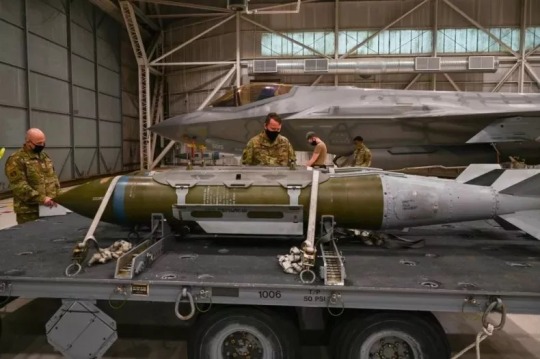
U.S. Air Force senior airman and 33rd Aircraft Maintenance Squadron weapons load crew member runs checks on an inert GBU-31 V3 bomb during a weapons load competition April 16 at Eglin Air Force Base, Florida. The U.S. exports such Joint Direct Attack Munitions to around 30 countries around the world. AIRMAN COLLEEN COULTHARD/33RD FIGHTER WING PUBLIC AFFAIRS/U.S. AIR FORCE
Hamas has denied that it had a presence in the building, one of a growing number of Gaza high-rises reduced to rubble over the past week.
"The targeting of Al-Jalaa Tower is part of a series of war crimes and crimes against humanity that are being committed against civilians," Hamas spokesperson Fawzi Barhoum said Monday in a statement obtained by Newsweek, "in addition to the targeting of homes, residential neighborhoods and civilian institutions."
Abu Obeida, spokesperson for Hamas' Al-Qassam Brigades, threatened on Monday to unleash a new round of rockets against Tel Aviv if the IDF did not cease bombing what he called "civilian homes and apartments." The IDF on Monday stepped up its bombing of what it said were "houses served as a part of Hamas' terror infrastructure."
Hamas and affiliated organizations such as Palestinian Islamic Jihad have fired what the IDF estimates to be 3,350 rockets toward Israel over the past week, hundreds of which were said to have fallen short of Israeli territory and hundreds more of which were intercepted by the advanced Iron Dome defense system. Israeli operations from land, air and sea, meanwhile, have targeted hundreds, if not thousands of sites across the densely-populated Palestinian enclave.
The conflict's death toll is estimated have reached well over 200, with the Gaza-based Ministry of Health placing the Palestinian toll at 212, most from Israeli bombings but also including nearly two dozen killed by Israeli police in the West Bank, and the IDF counting 10 Israelis dead due to rocket fire.
0 notes